Kaipo Name
As soon as we enter Kaipo, it’s clear that the location text is different in Japanese and English:
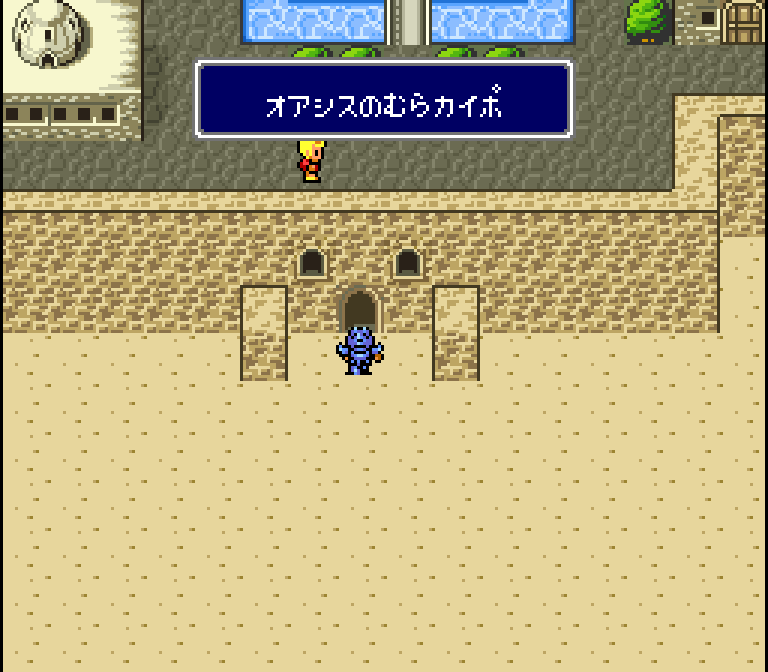 | 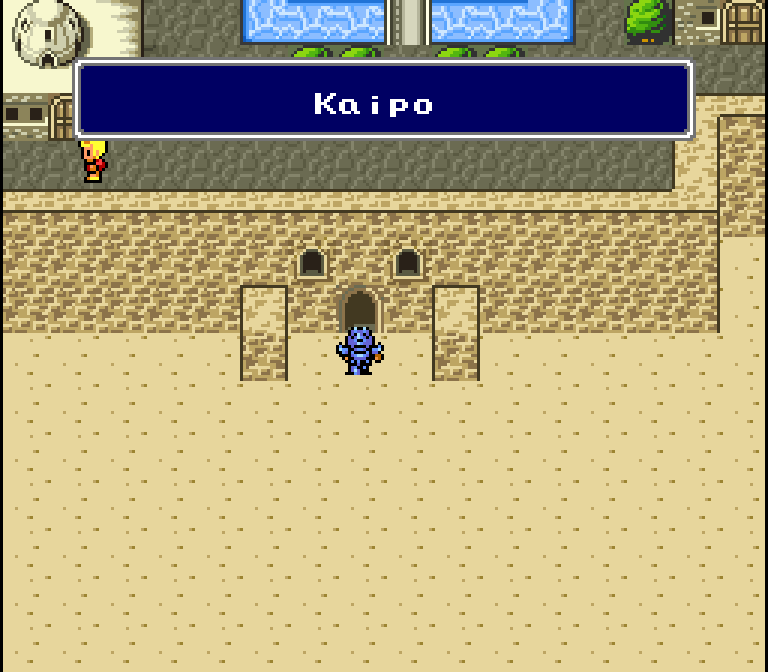 |
| Final Fantasy IV (Super Famicom) | Final Fantasy II (Super NES) |
In Japanese, the text says something like , “Kaipo, the Oasis Village”.
In English, it just says, “Kaipo”.
Inn Scene
After entering Kaipo, Cecil takes Rydia to the inn to get some rest. What the innkeeper says in each version is slightly different:
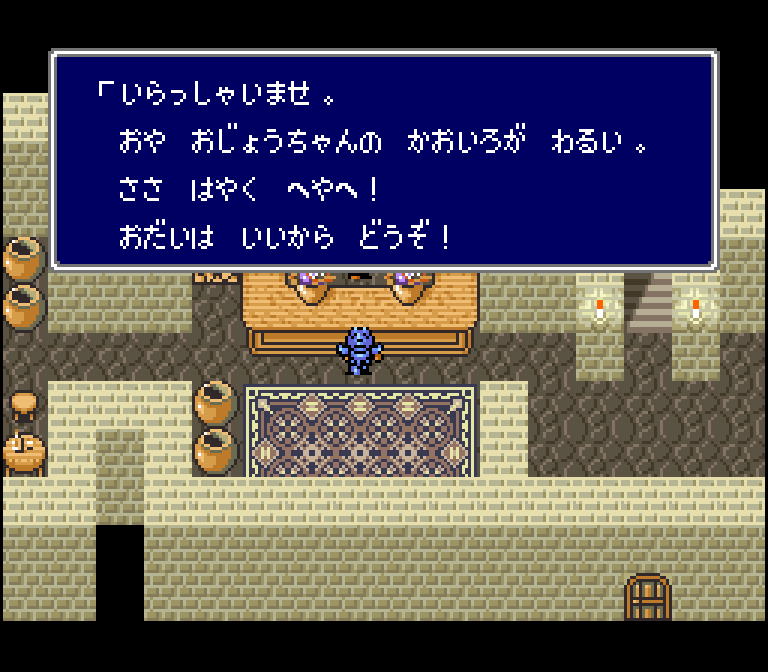 | 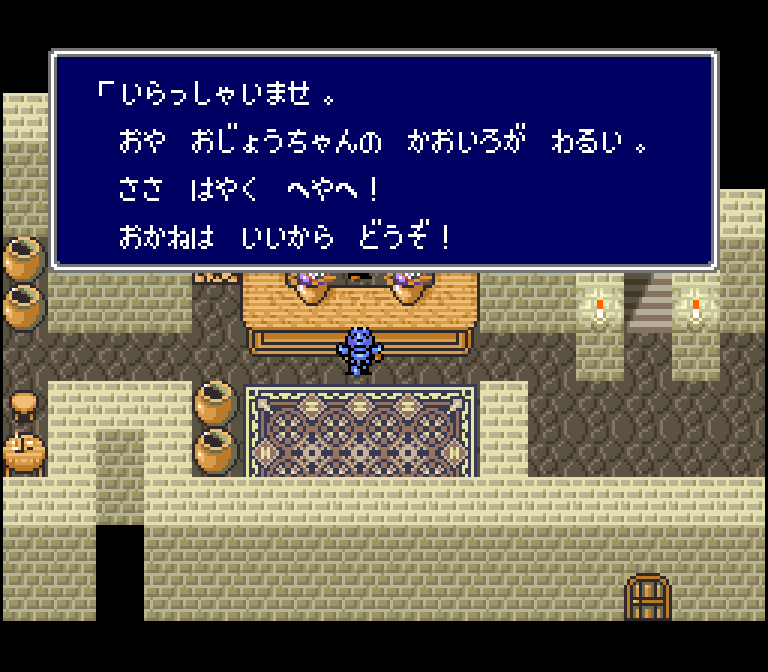 | 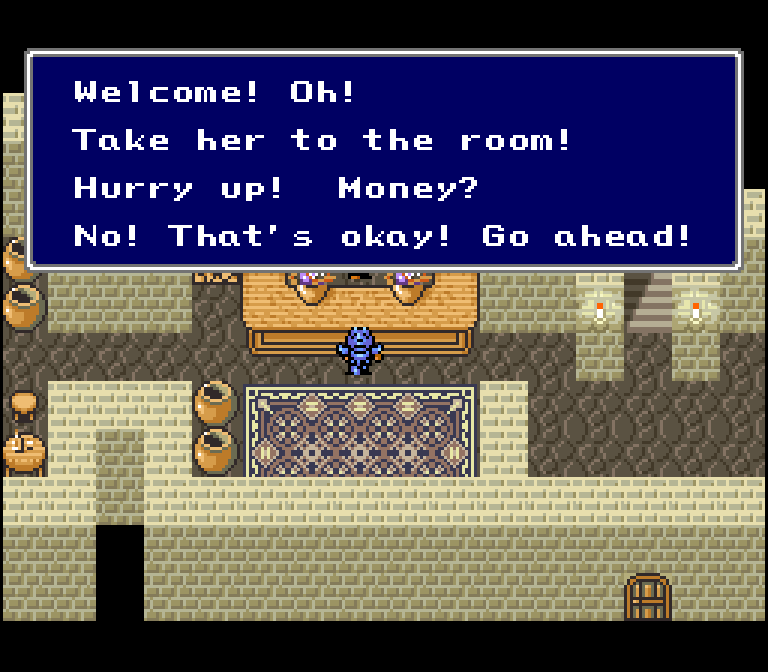 |
| Final Fantasy IV (Super Famicom) | Final Fantasy IV Easy Type (Super Famicom) | Final Fantasy II (Super NES) |
| Final Fantasy IV (basic translation) | Final Fantasy IV Easy Type (basic translation) | Final Fantasy II (Super NES) |
| Welcome. Oh, the little girl’s looking pale. Go on, hurry to the room! Don’t worry about the fee! Go right on ahead! | Welcome. Oh, the little girl’s looking pale. Go on, hurry to the room! Don’t worry about the money! Go right on ahead! | Welcome! Oh! Take her to the room! Hurry up! Money? No! That’s okay! Go ahead! |
From this we see that the English localization leaves out the specific part about Rydia not looking very well.
The Final Fantasy IV Easy Type text has also changed the word for “fee” to “money”. Or at least that’s the closest I can approximate the change in English.
If you check page 27 of the Final Fantasy II manual, you’ll see a piece of this guy’s text in its unfinished form. It’s essentially the same as the final release, but it has some different spacing and some ellipses that got removed at some point.
Meeting Rydia
Cecil puts Rydia into a bed and then talks to her. The short dialogue is a little different in each game:
 | 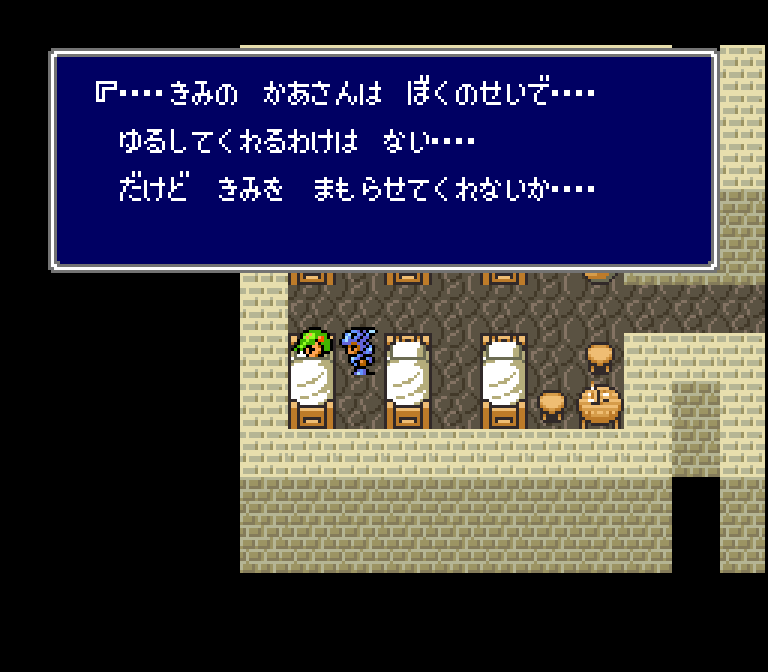 | 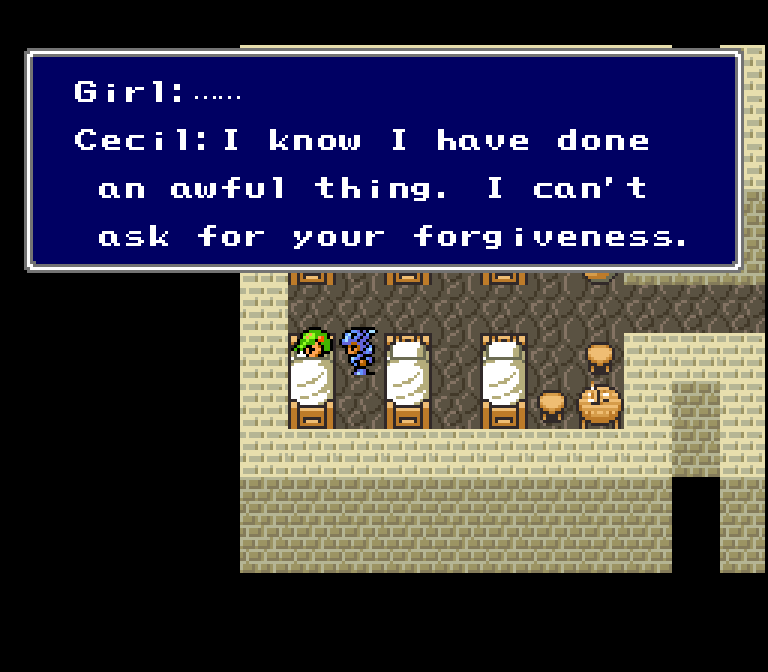 |
| Final Fantasy IV (Super Famicom) | Final Fantasy IV Easy Type (Super Famicom) | Final Fantasy II (Super NES) |
| Final Fantasy IV (basic translation) | Final Fantasy IV Easy Type (basic translation) | Final Fantasy II (Super NES) |
| Cecil: Oh, you’re conscious. | Cecil: Oh, you’re conscious. | Cecil: You okay? |
| Girl: …. | Girl: …. | Girl: …… |
| Cecil: I still haven’t asked you your name. | Cecil: I still haven’t asked you your name. | Cecil: I haven’t heard your name yet. |
| Girl: …. | Girl: …. | Girl: …… |
| Cecil: I basically killed your mom… There’s no way you can forgive me… But could you at least let me protect you…? | Cecil: It’s my fault that your mom… There’s no way you can forgive me… But could you at least let me protect you…? | Cecil: I know I have done an awful thing. I can’t ask for your forgiveness. But, at least, let me protect you. Please. |
| Girl: … | Girl: …. | Girl: …… |
A couple differences here.
First, it’s clearer in the original text that Rydia regains consciousness at the start of this scene. In the English translation, it makes it sound like she was already conscious again.
Second, we see that “I pretty much killed your mom” line in Final Fantasy IV was toned down to be a little more vague in the Easy Type version. This was changed even further in the English localization to simply say, “I know I have done an awful thing.”
I do have to say that, “I can’t ask for your forgiveness. But, at least, let me protect you. Please.” is a really good translation of the original text. It almost has the mark of a native speaker having polished it up a bit. I do know that Ted Woolsey did do some basic script examining work, as he mentions here. I wonder if this was something he did.
Again, on page 27 of the Final Fantasy II manual, we can see a piece of a screenshot of this conversation that’s slightly different from what the final release has. The pre-release text has an extra ellipsis. Not a huge change, but I guess at some point someone decided to go through the script and weed out a lot of them.
Baron Soldiers Attack
During the night, a bunch of Baron soldiers show up to take Rydia away:
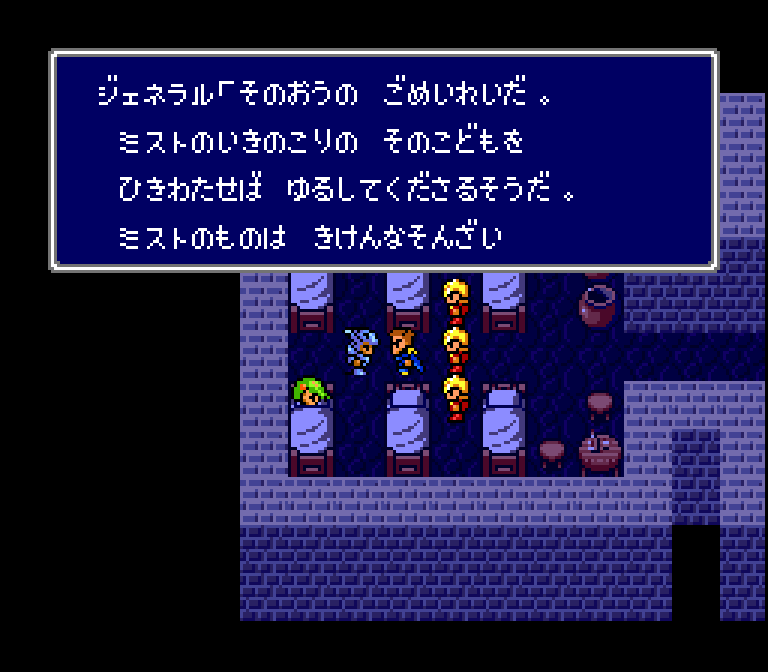 | 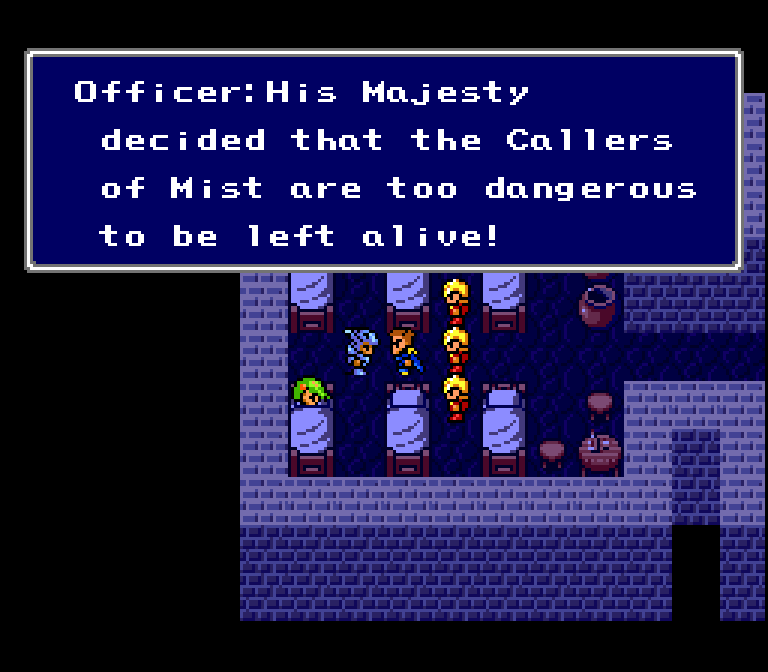 |
| Final Fantasy IV (Super Famicom) | Final Fantasy II (Super NES) |
| Japanese Version (basic translation) | English Translation |
| General: We’ve found you, Cecil! | Officer: I finally found you, Cecil! |
| Girl: ! | Girl: !! |
| Cecil: Wait! King Baron doesn’t… | Cecil: Wait! |
| General: Our orders come from that same king. He says he’ll forgive you if you hand over that surviving Mist child. The people of Mist are apparently a danger, you see! | Officer: His Majsty decided that the Callers of Mist are too dangerous to be left alive! |
| Cecil: What!? | Cecil: What!? |
| Girl: ! | |
| General: Now hand over the girl! | Officer: Hand her over! |
| Cecil: I refuse! | Cecil: No!! |
Here we see that this head soldier is actually a general and not just a generic “officer”. It’s strange, because the Japanese text actually uses the English word for “general”.
We also see that Cecil tries to plead with the general by talking about the king, but then the officer turns that right around at him. This isn’t in the English translation.
Also, the girl’s reaction was removed from the English version.
Lastly, we see that the English localization has changed it to say that “the Callers of Mist are too dangerous to be left alive”. The original text is more vague and says something like, “The people of Mist are a dangerous existence.” So the English localization makes it just a tiny bit clearer that they’re going to kill her. How odd.
While we’re here, I should point out that the normal trend in modern Japanese is to use “!?” for an emphatic question. In English there’s a bigger split between users of “?!” and users of “!?”.
Here we see that the translators stuck with the original text’s style and used “!?” in the English text.
Personally, I tend to go with “?!” since it seems more logical to me – a question sentence is a question sentence before all else. So that’s why my own game translations and such often handle it that way. But everyone’s different.
That said, I still wonder when games will start using interrobangs.
Rydia’s Name
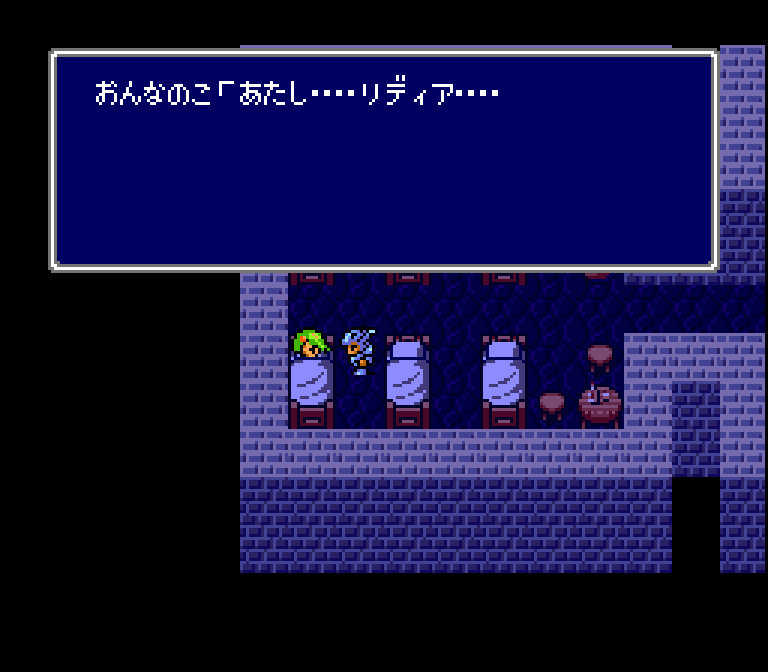 | 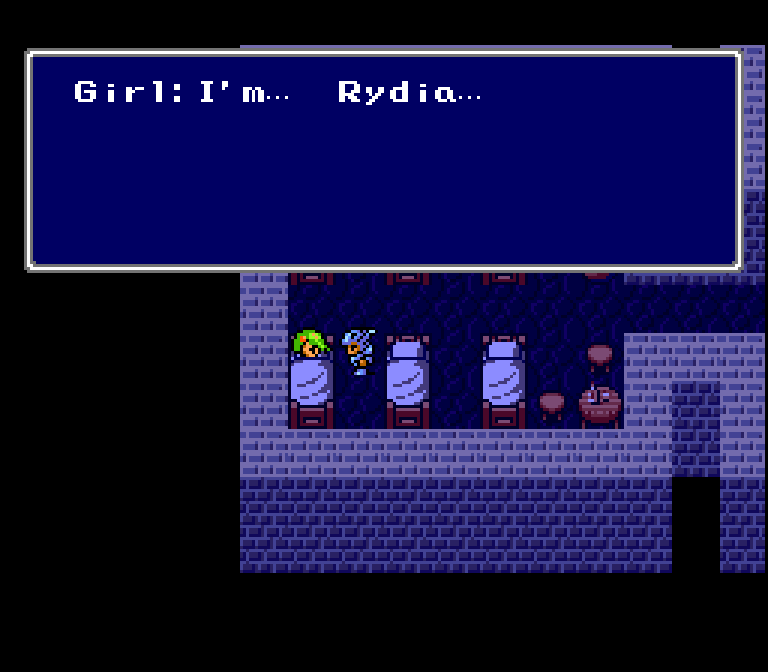 |
| Final Fantasy IV (Super Famicom) | Final Fantasy II (Super NES) |
After you save Rydia, she tells you her name. There’s nothing different here, but a common question among fans is if “Rydia” is how her name should be spelled and not something else like “Lydia”. Given the famous Japanese “L” and “R” problem, it’s certainly possible. Plus there was a “Lydia” in MOTHER 3, whose name was based on a musical scale.
There are so many guides, manuals, and pieces of merchandise out there that I can’t possibly check everything, but the Japanese instruction manual does include this:
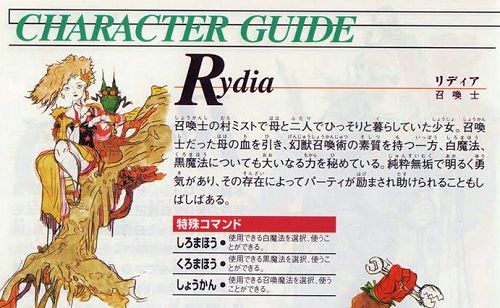
In all honesty, it’s very common for Japanese creators to get the English translations of their own stuff wrong – I’ve seen it all the time and have had to wade through piles of spreadsheets of it over the years. But given how unusual the spelling “Rydia” is, my guess is that it’s indeed the intended spelling.
But if I’m wrong and the creators said otherwise at some point in time, let me know! Or if you know of any other documents that suggest her name should be spelled differently, please let me know.
Incidentally, despite the “y” in her English name, that vowel should most likely be pronounced in English with an “ee” or “ih” sound. Japanese pronunciation and English pronunciation can be pretty wacky and hard to go back and forth between, but at the very least her name shouldn’t be pronounced in a way that rhymes with “Idea”.
Party Leader Change
After the nighttime scene, Cecil walks to the inn counter, puts his hand up, and says, “Let’s go!”:
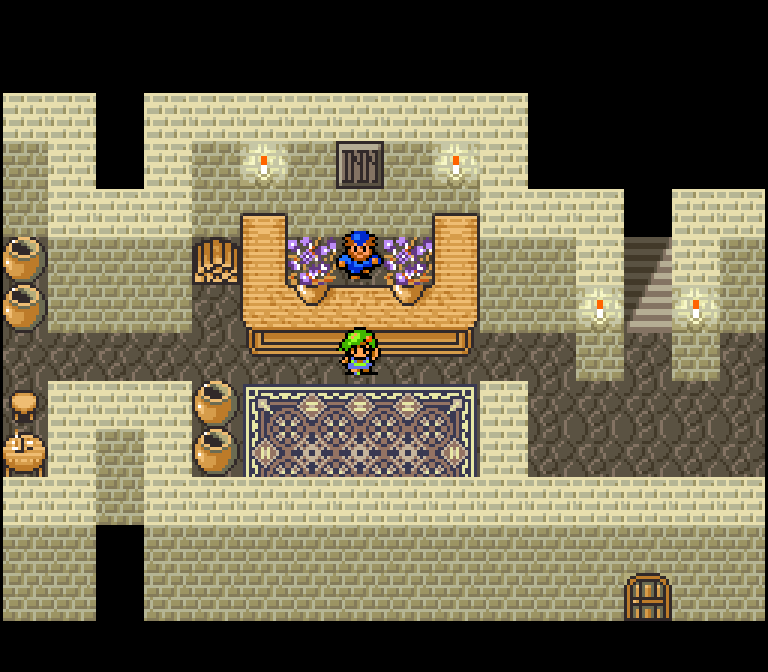 | 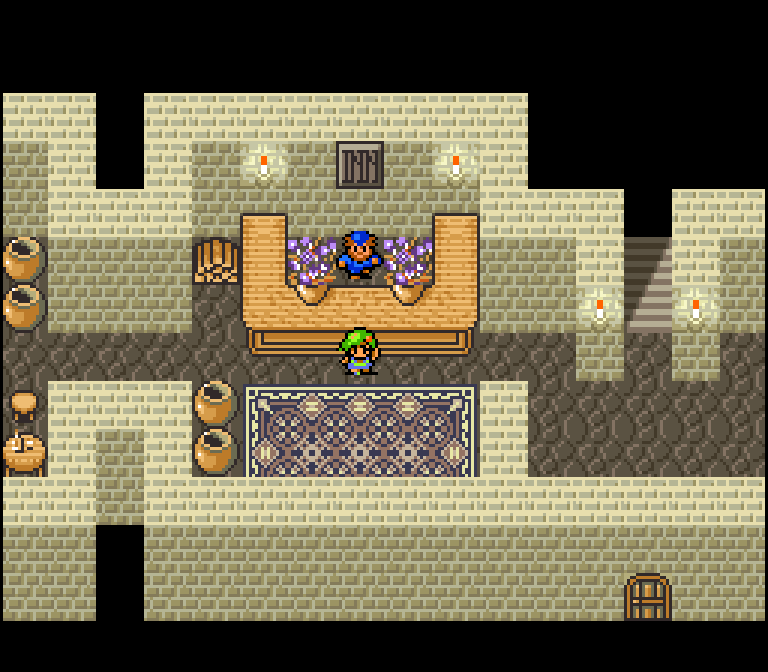 |
| Final Fantasy IV (Super Famicom) | Final Fantasy II (Super NES) |
I remember liking this part when I was a kid because the game forgets to put his hand back down. So if you switch to Rydia using the R-Button she’ll have her hand up too.
I wanted to see if it worked in the other versions of the game – and it indeed does.
So there you go, kid me. It works in the Japanese versions too!
Family Trouble
This lady by the item shop talks about Anna and Tellah:
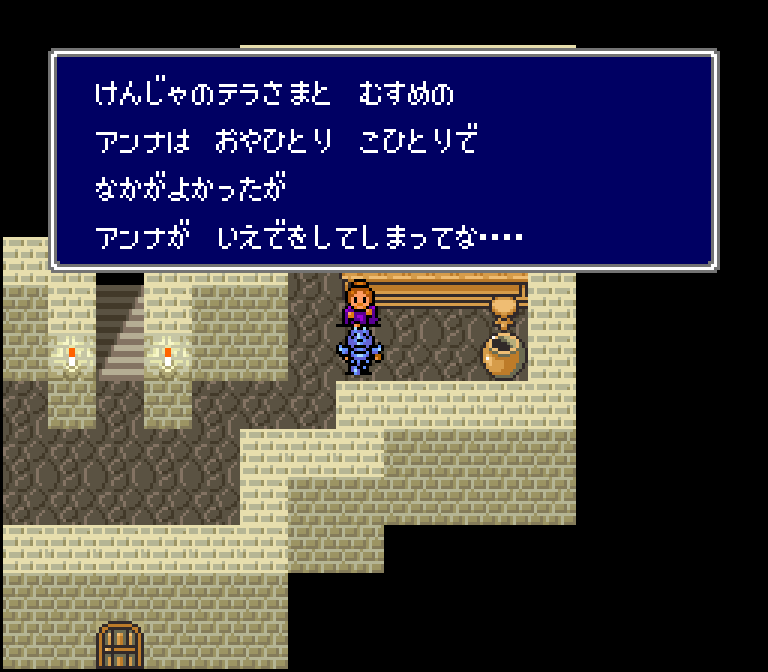 | 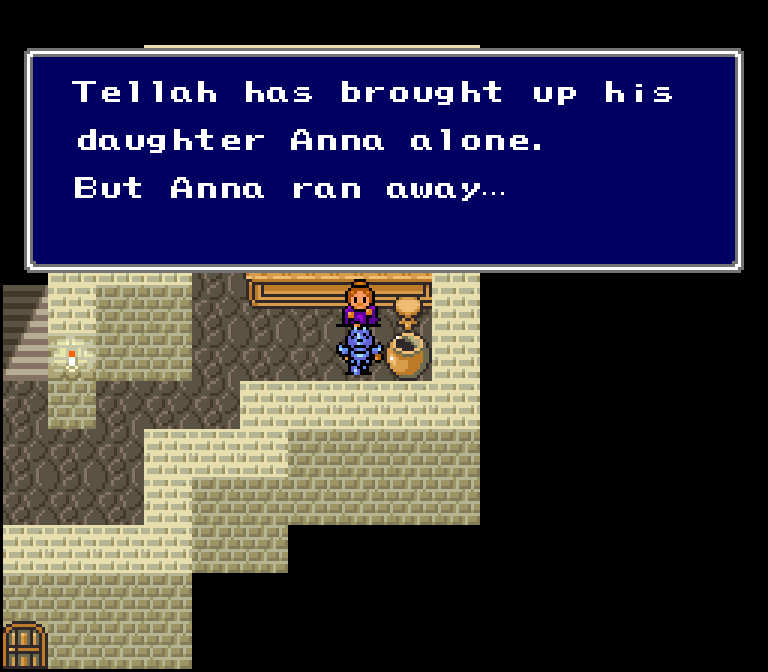 |
| Final Fantasy IV (Super Famicom) | Final Fantasy II (Super NES) |
| Japanese Version (basic translation) | English Translation |
| Tella the sage and his daughter Anna were on very good terms as a single parent and a single child, but then Anna ran away from home… | Tellah has brought up his daughter Anna alone. But Anna ran away… |
The big difference here is that the English localization doesn’t mention that they were originally on good terms. It’s slightly implied, but not made clear. It’s certainly possible to raise a child by yourself and not be on good terms with each other.
Bars & Pubs
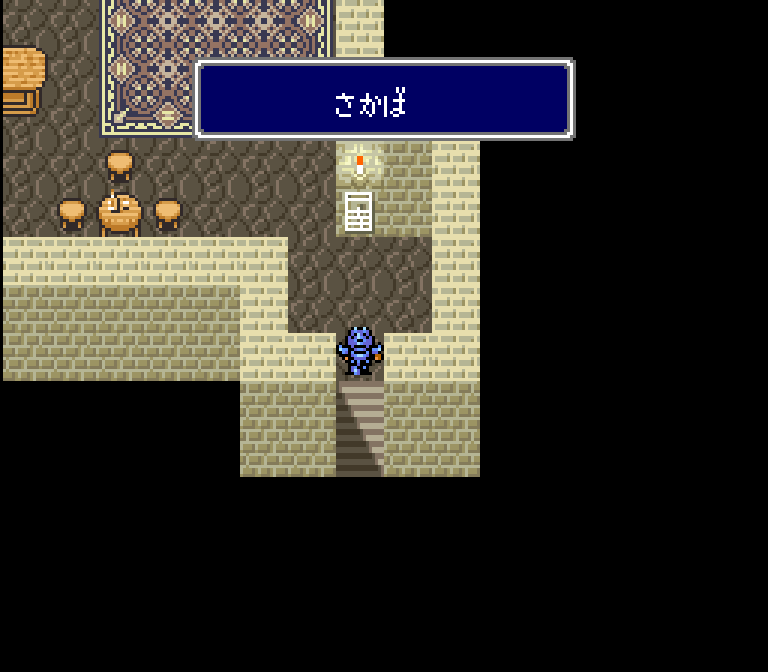 | 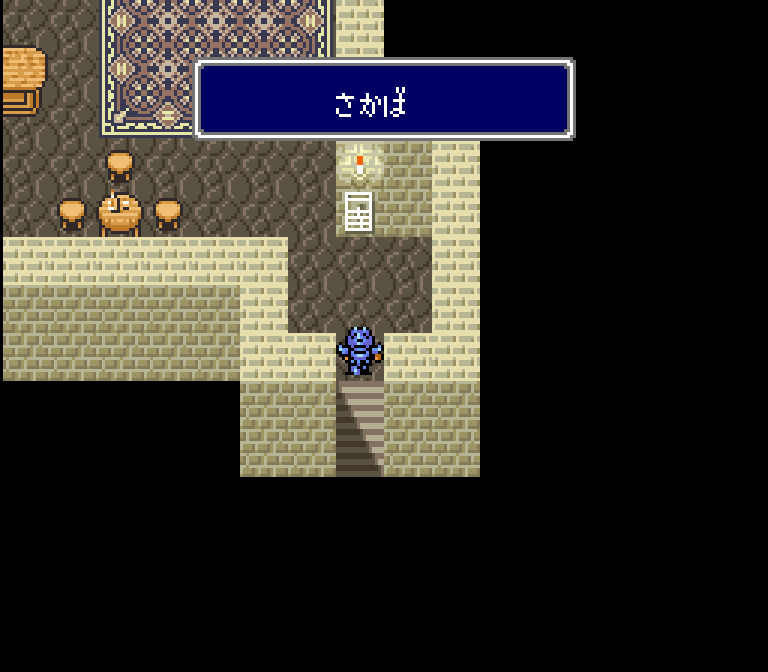 | 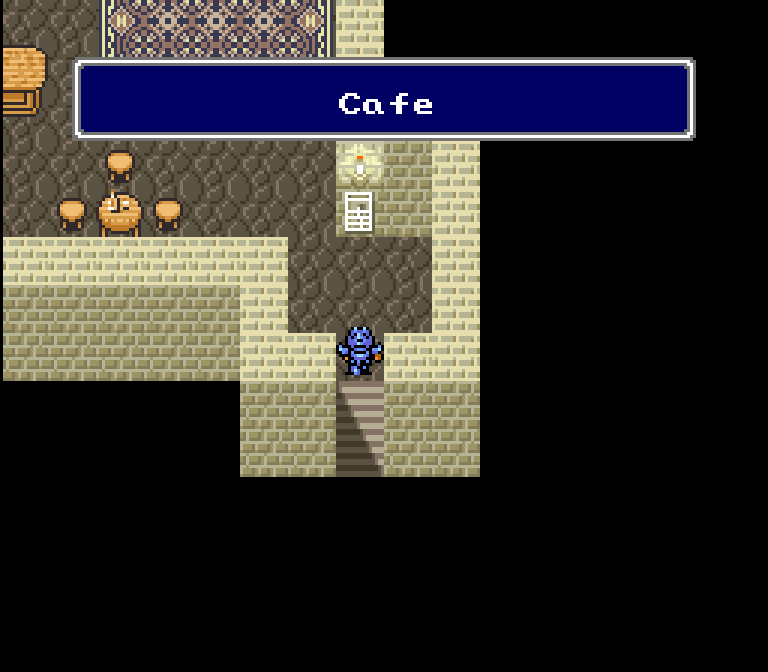 |
| Final Fantasy IV (Super Famicom) | Final Fantasy IV Easy Type (Super Famicom) | Final Fantasy II (Super NES) |
In Final Fantasy IV, there’s a pub above the inn in Kaipo.
This was changed in the English localization to a cafe.
Interestingly, it’s still a pub in the Easy Type version, even though we’ve seen some other drinking stuff toned down a tiny bit elsewhere in Easy Type.
This change from a pub/bar to a cafe was common back in 90s-era video game localizations. One such example is EarthBound:
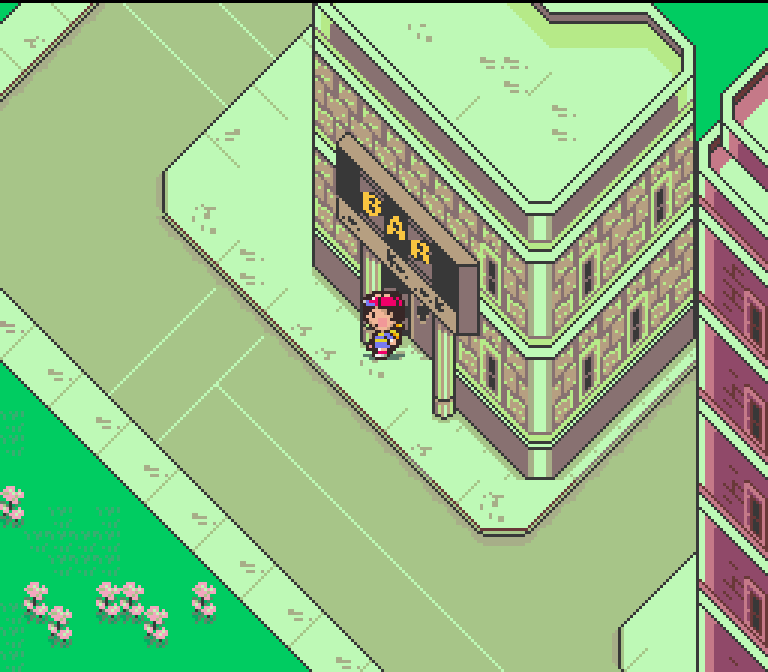 |  |
| MOTHER 2 (Super Famicom) | EarthBound (Super NES) |
And this same thing happened in Final Fantasy VI’s localization – when it was released in English as Final Fantasy III it had a pub-to-cafe change as well:
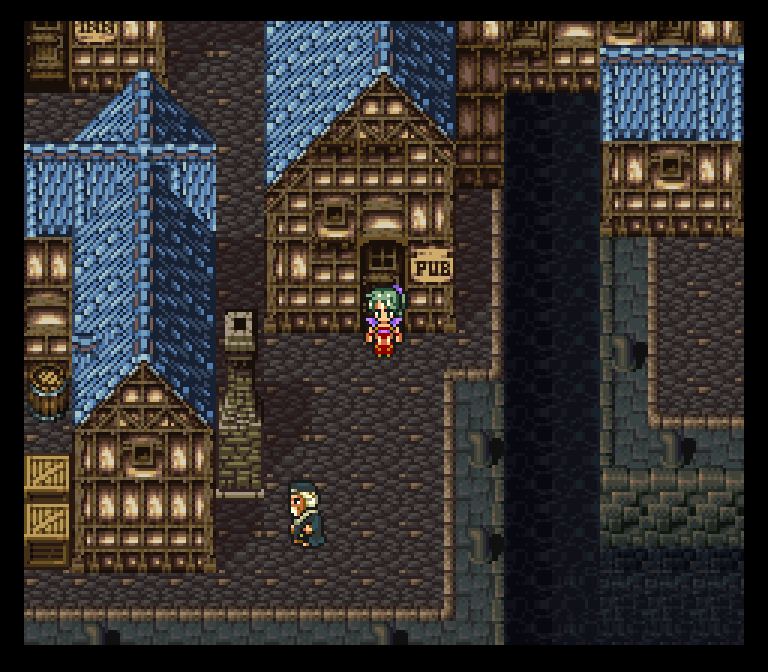 | 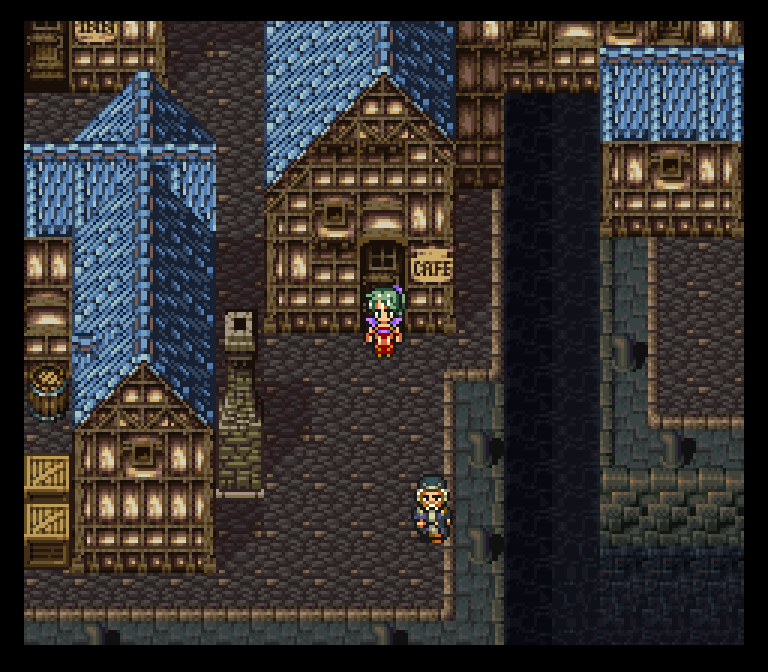 |
| Final Fantasy VI (Super Famicom) | Final Fantasy III (Super NES) |
I could probably list a bunch of other examples, but I’ll leave that as an exercise to the reader instead.
Kaipo Drink
The flier on the pub/cafe wall is also changed somewhat:
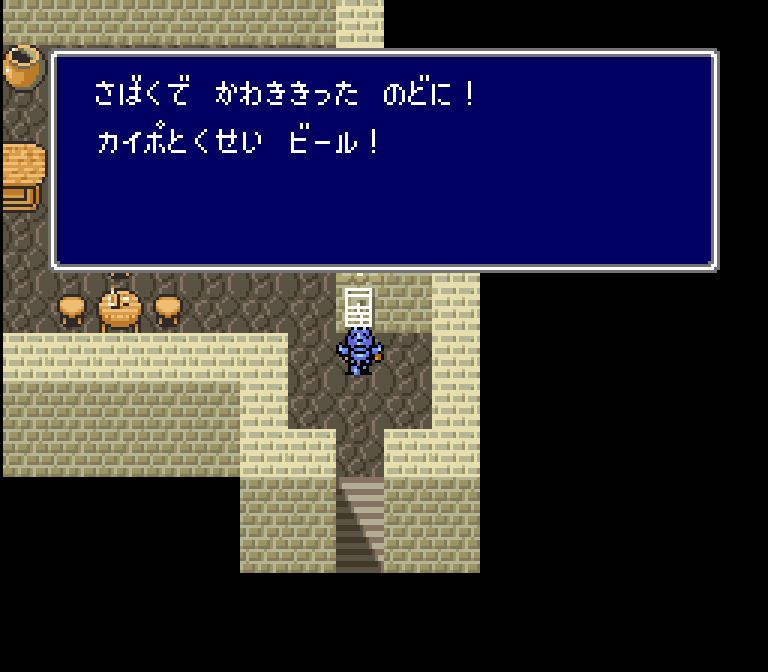 | 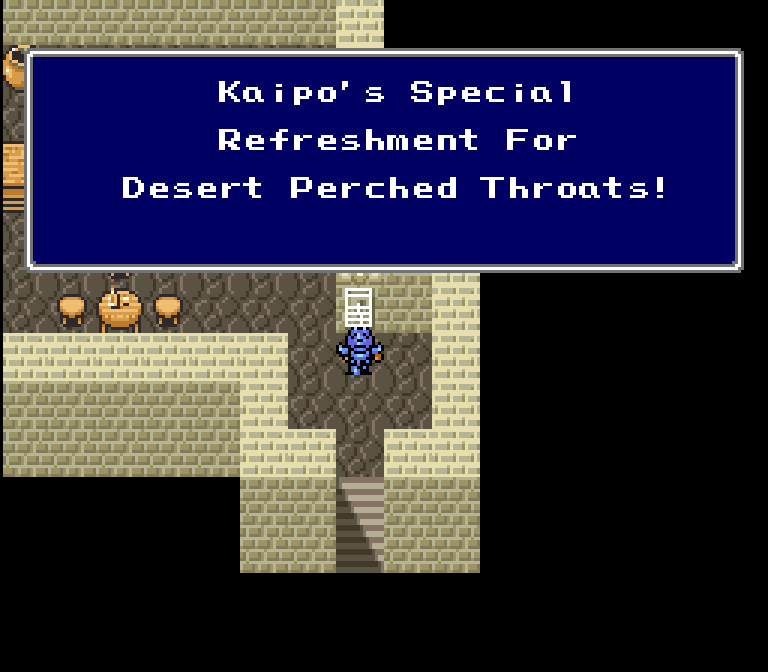 |
| Final Fantasy IV (Super Famicom) | Final Fantasy II (Super NES) |
| Japanese Version (basic translation) | English Translation |
| For desert-parched throats! Kaipo’s special beer! | Refreshment For Desert Perched Throats! |
So it looks like “special beer” became “special refreshment”. In other game localizations I’ve seen booze changed to “coffee”. Interesting how they just went completely vague with it here.
As we saw before in Baron, the localization has centered the flier’s text. The Japanese text doesn’t have this, although it does have more of a Japanese-style marketing/copywriting vibe to it.
Also, I’m pretty sure that “Perched” is a typo and it should be “Parched”. Unless there are throats sticking out of the desert sand and you need to pour refreshments into them.
For reference, the PlayStation translation calls this place a pub, but changes the text here and calls it “Kaipo Punch” instead of beer for some reason. How odd.

The fan translation, for some reason, still calls this place a “Cafe”, even though the patch was supposed to uncensor stuff like that. So that’s pretty strange, but even stranger is that this sign keeps in the alcohol reference and even adds more to it that wasn’t there before:
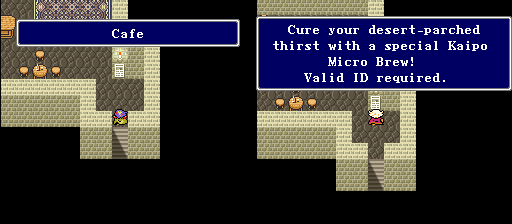
I’ve heard that the GBA translation is basically the PlayStation translation with some added touch-ups and flourishes. Which explains why it calls this place a pub and calls the drink “Kaipo Punch”, just as the PlayStation translation did.
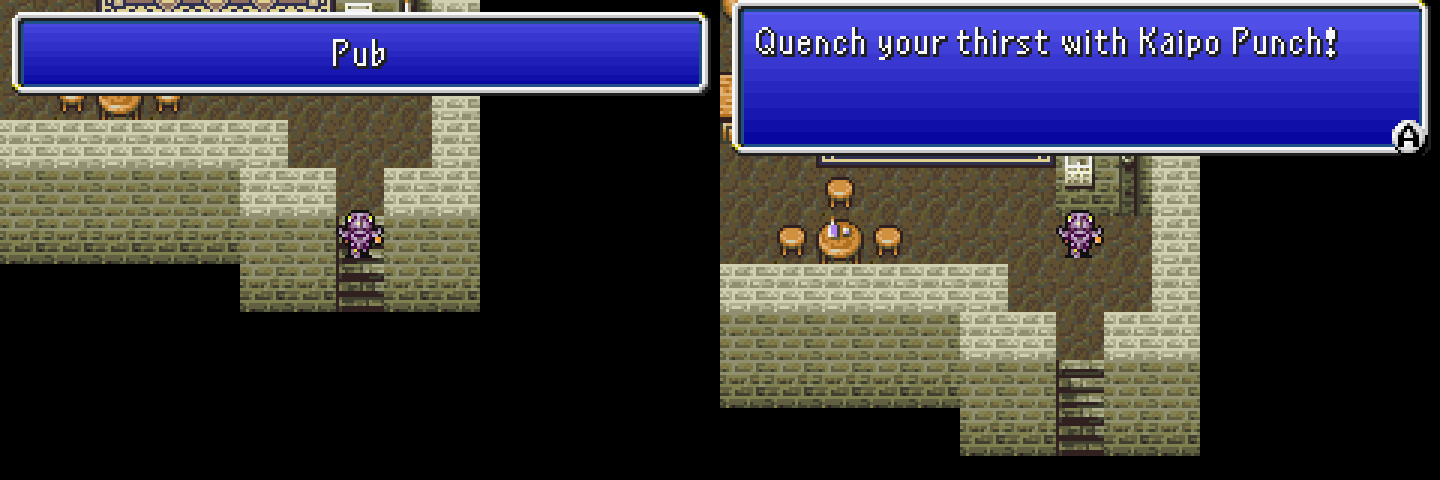
The official DS translation definitely does the best job so far – it keeps the place as a “Pub” and writes around the alcohol reference without axing the concept completely: “Soothe your desert-parched throat with a mug of Kaipo’s finest!”
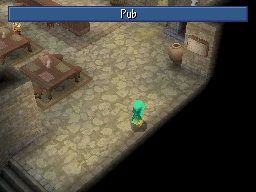 | 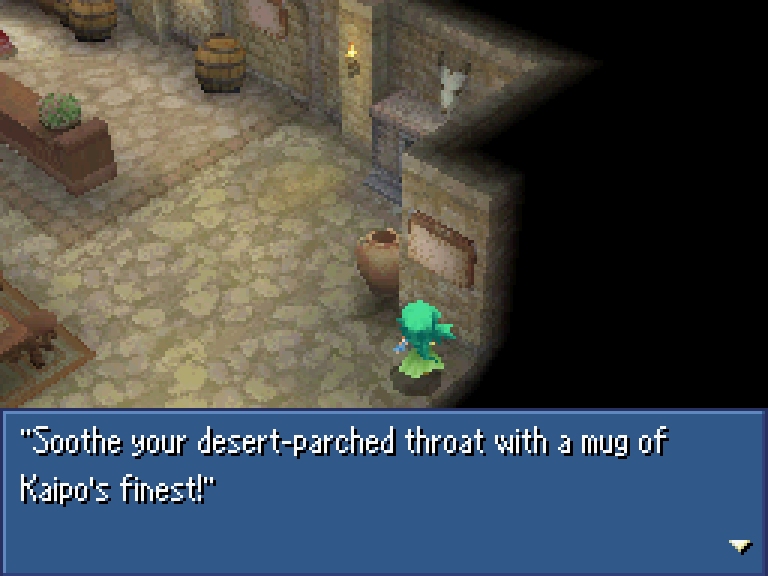 |
| DS translation | |
It’s crazy to think that in all current English versions of this game – all four official ones and even the fan translation – not one has yet to actually use the word “beer” here. It’s unquestionably there in the Japanese script, so my only conclusion is that beer makes people crazy.
Still, as simple and as unimportant as this stuff is, it actually showcases the different aspects of each translation pretty well.
- Final Fantasy II SNES has a high level of censorship and extremely poor (to the point of being improper) English.
- The PlayStation translation has less censorship but replaces existing text with entirely made-up text in some places. It also features an ugly variable width font.
- The fan translation accidentally censors the game (!), rewrites things in an attempt to be clever, and adds things out of nowhere for no real reason, also in an attempt to be clever. Despite being billed as the definitive translation of the game, that’s clearly not the case.
- The GBA translation is essentially the PlayStation translation with some minor tweaks.
- The DS translation is well done and handles the alcohol issue with grace.
In a way, we can see the progress of localization quality over time in just this tiny comparison. It’s of course silly to say that this pattern is absolute and that one version is better than another in every possible way, but hopefully this helps give a general feel of what each translation is like!
Traveling Scholar
This guy in the Kaipo pub has more to say in Japanese than in English:
 | 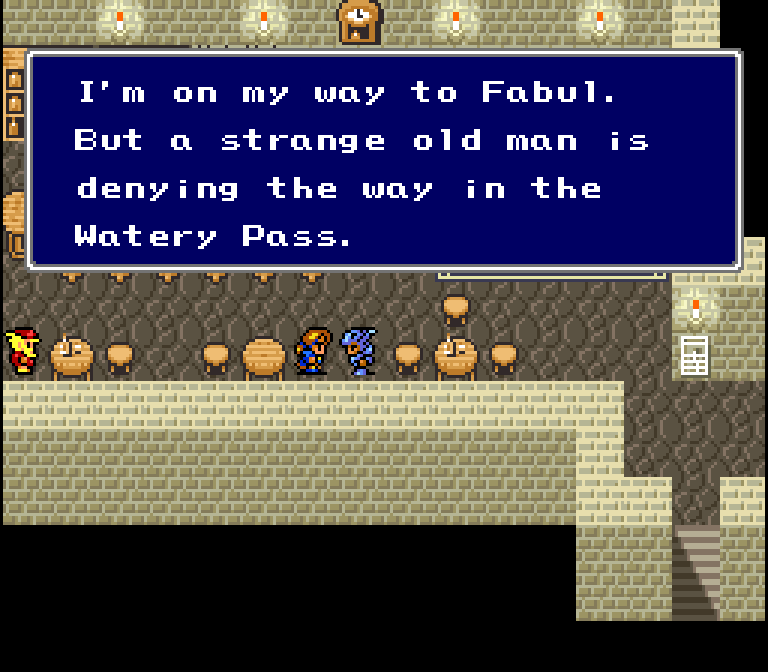 |
| Final Fantasy IV (Super Famicom) | Final Fantasy II (Super NES) |
| Japanese Version (basic translation) | English Translation |
| Hey there, I’m a traveling scholar. I want to go to Fabul, east of Damcyan, to do research, but there’s a weird old guy in the underground water vein who won’t let anyone through. | I’m on my way to Fabul. But a strange old man is denying the way in the Watery Pass. |
There are a few points of interest here:
- The fact he’s a traveling scholar is completely removed in the English localization.
- His purpose for going to Fabul is missing in the English localization.
- This is the first time we hear of Fabul, but the Engish localization leaves out key details about it – namely that it’s to the east of Damcyan. Since your current goal is to seek the help of other countries, this information is important to have. The game leads you there anyway so it doesn’t matter, but it’s still good to know more about the world you’re trekking through.
- The cave area coming up is literally called an “underground water vein” in Japanese. This sort of makes sense – it’s probably through this water vein that this desert oasis exists.
- The English localization gives the underground water vein an actual name: the “Watery Pass”.
Business Drinker
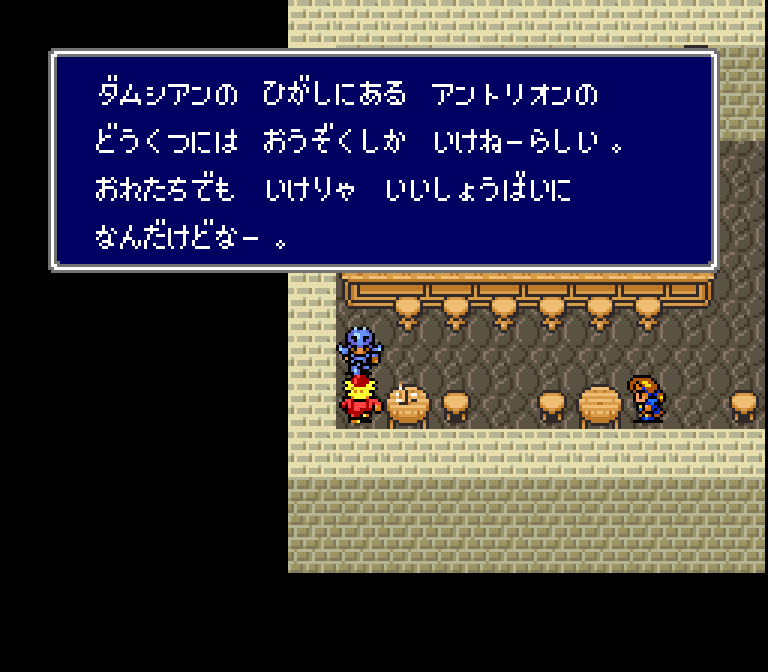 | 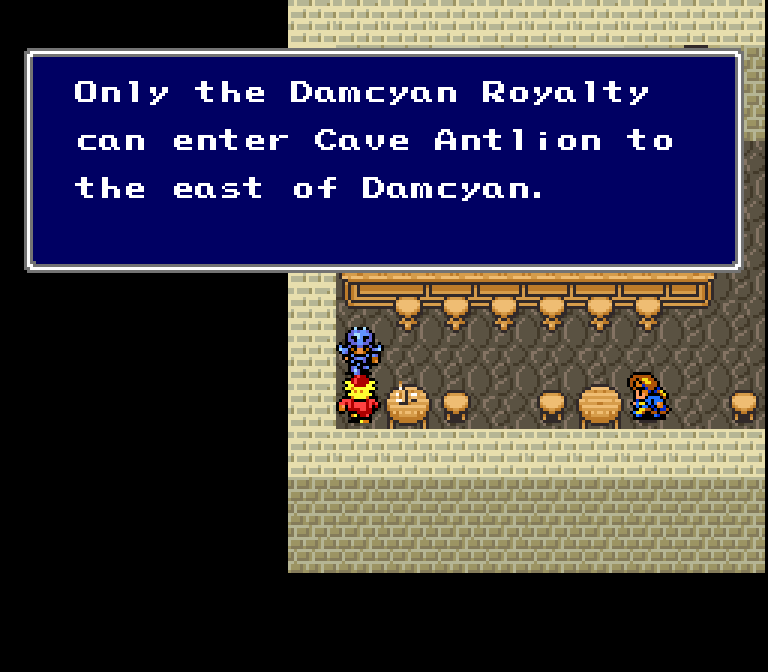 |
| Final Fantasy IV (Super Famicom) | Final Fantasy II (Super NES) |
This other guy in the pub had his text slimmed down a bit in the localization:
| Japanese Version (basic translation) | English Translation |
| Apparently only the royal family can go to the Antlion’s cave to the east of Damcyan. | Only the Damcyan Royalty can enter Cave Antlion to the east of Damcyan. |
| If we could go too it’d great for business, though. |
In Japanese this guy speaks in a loose, rough way – sort of like a rugged guy, I guess you could say. This doesn’t come across at all in the English translation.
We also see that the English translation drops the entire part about him wishing he could go too so he could make money.
I also think it’s odd how the translated text, despite the limited amount of space given, decided to use the word “Damcyan” twice even though it was unnecessary and not in the original text that way.
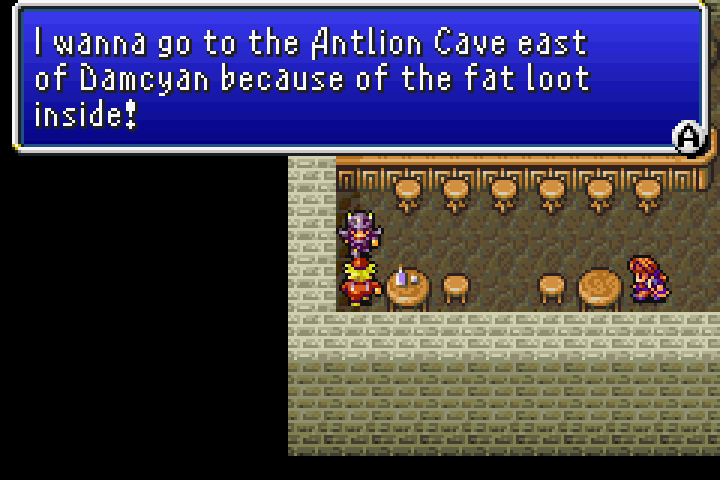
In the GBA version, this line was punched up quite a bit to say:
I wanna go to the Antlion Cave east of Damcyan because of the fat loot inside!
Too bad only the royals are allowed there…
I really find it hard to believe this guy would honestly say “fat loot”. If it were say, a Disgaea game or something, I could see it. But it seems like the defining characteristic of the GBA translation is the insertion of Internet/geek slang and in-jokes that don’t suit the world of Final Fantasy IV at all.
Bartender Woman
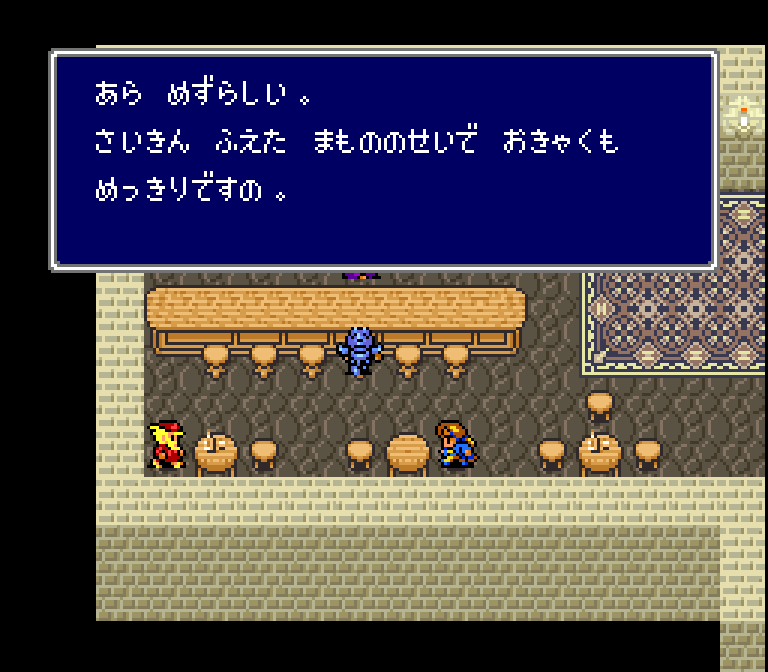 | 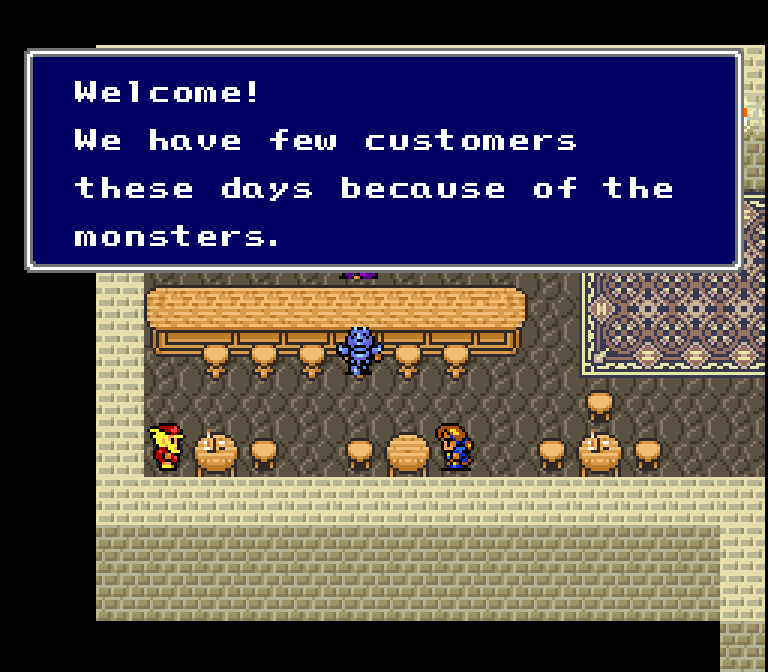 |
| Final Fantasy IV (Super Famicom) | Final Fantasy II (Super NES) |
In English, this bartender lady says, “Welcome! We have few customers these days because of the monsters.”
The Japanese text isn’t too different, but she says something roughly like, “Oh, how rare. We hardly have customers these days because of the increase in monsters.”
I guess the main difference is that she’s surprised in the Japanese text but not surprised in the English text. Instead, she just welcomes you.
Training Room
Earlier, we saw that the Baron training room in Final Fantasy IV was expanded and moved in Final Fantasy IV Easy Type and Final Fantasy II.
A training room was also added to Kaipo in the Easy Type version and English localization. If you go inside you’ll find it’s the exact same training room as in Baron.
This room doesn’t exist in Final Fantasy IV’s Kaipo, so players pretty much have to get the basics down before leaving Baron. In Easy Type and Final Fantasy II there are a few more copies of the training room throughout the world.
As we can see, the door to the training room was attached to a previously sealed off building:
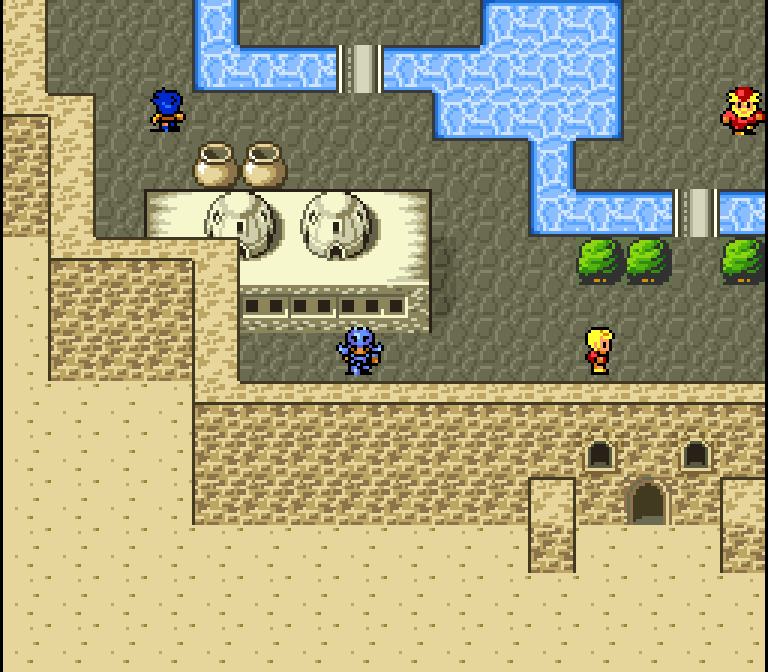 |  | 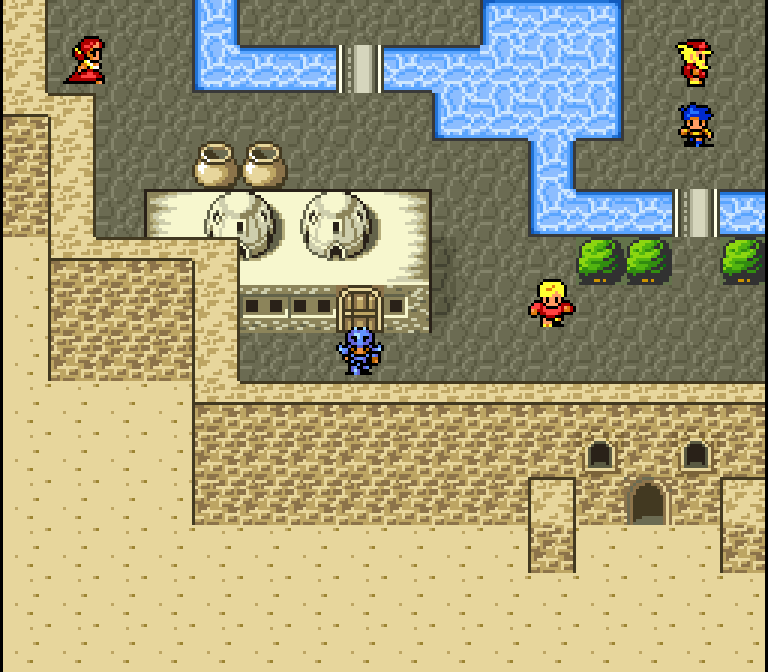 |
| Final Fantasy IV (Super Famicom) | Final Fantasy IV Easy Type (Super Famicom) | Final Fantasy II (Super NES) |
For reference, here’s what the Final Fantasy IV’s map of Kaipo looks like compared to the Easy Type / Final Fantasy II map:
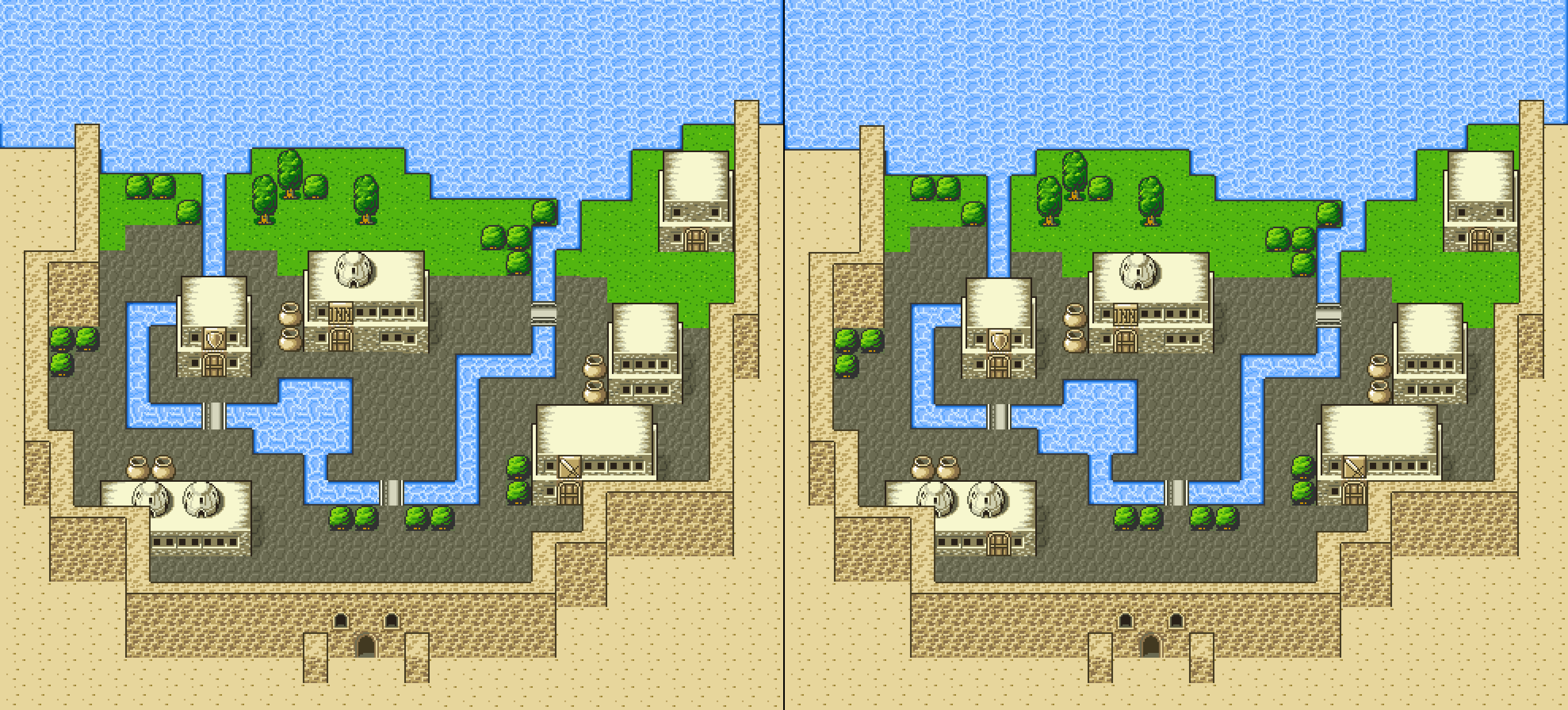
The only difference I see is the added door. If I’ve missed anything, let me know!
Dancing Girl
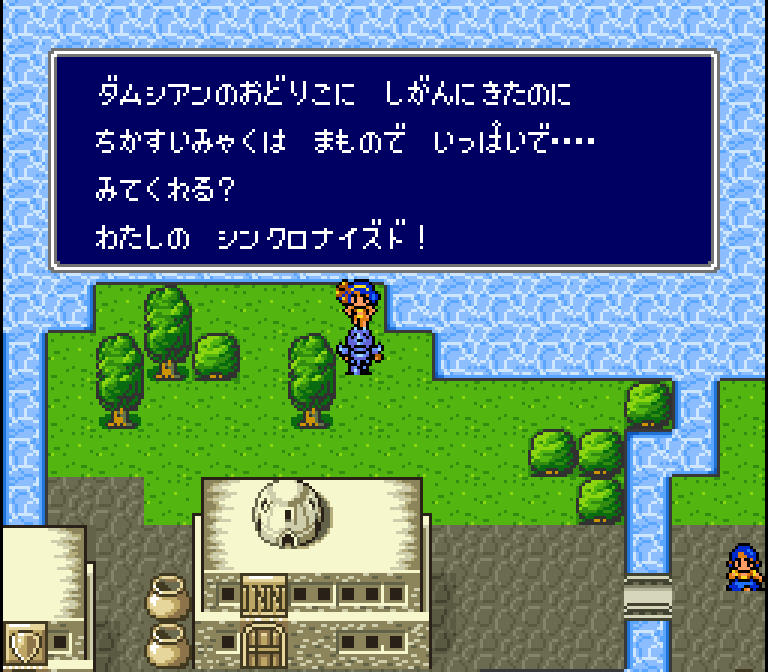 | 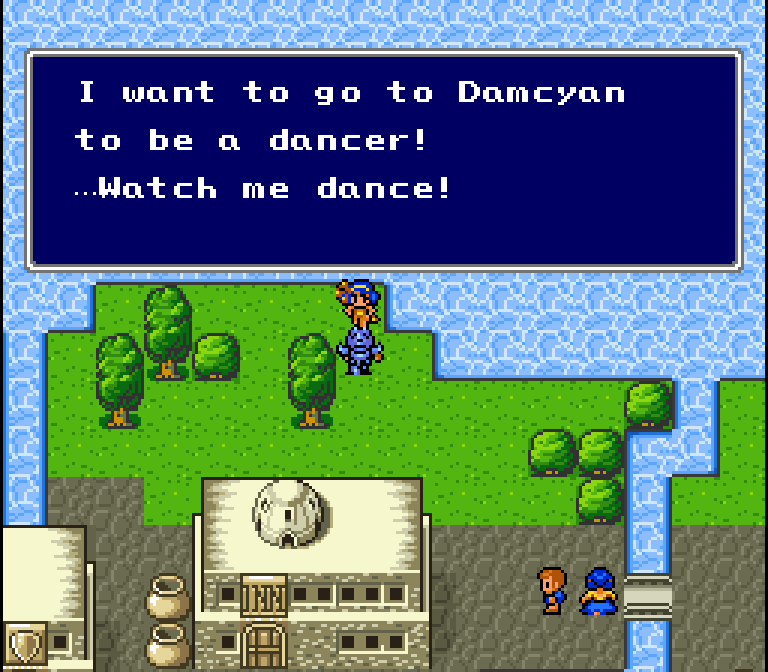 |
| Final Fantasy IV (Super Famicom) | Final Fantasy II (Super NES) |
There was a dancer in Baron that got changed in Final Fantasy IV Easy Type and Final Fantasy II, so what fate befell the dancer in Kaipo?
The answer turns out to be: nothing was changed.
She does say something a little different in Japanese and English, though. In Japanese, she says, “I came here to apply to be a Damcyan dancer, but the underground water vein is filled with monsters, so… Will you watch my synchronized (routine)!?”
In English this is simplified to, “I want to go to Damcyan to be a dancer! …Watch me dance!”
So the Japanese version gives her some actual character – she has more motivation and an actual problem that’s preventing her from achieving her goal.
Also, the use of “synchronized” here is referring to the fact that part of her dance takes place in the water. The word comes from our English term “synchronized swimming”, but it’s very common for Japanese to take foreign words and use them in completely different ways.
It’s often the mark of an amateur translator to translate every English-born Japanese word back into English. This is a bad idea because of things like false friends and wasei-eigo.
Anyway, that’s why this line was changed and the whole thing about “synchronized” was changed to simply say “dance”.
Falling Down
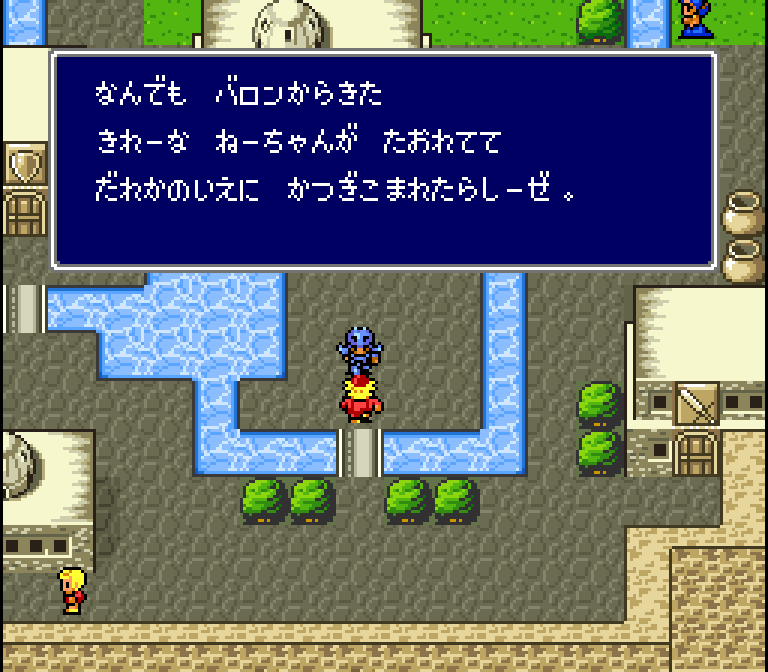 | 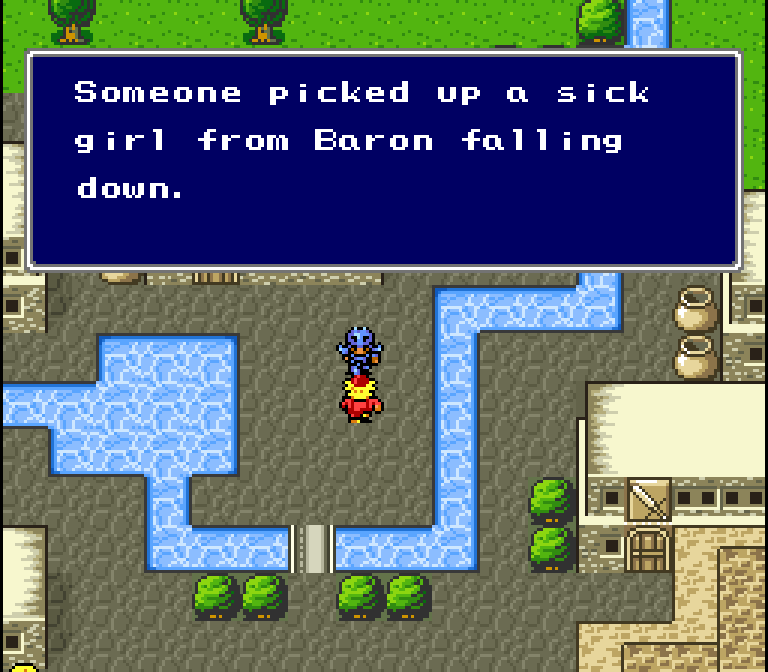 |
| Final Fantasy IV (Super Famicom) | Final Fantasy II (Super NES) |
In English, this guy in Kaipo says, “Someone picked up a sick girl from Baron falling down.”
…Wait, what? That’s not even correct grammar. If you try really hard you can maybe make it be proper grammar, but it’s clearly not intended that way.
Anyway, in Japanese the guy says, “Apparently a pretty girlie from Baron collapsed and was carried to someone’s house.”
So what we have here is actually a common translation mistake with the word “taoreru”, usually made either by someone just learning the language or by a non-native English speaker. Clearly the latter is the case here.
“Taoreru” can mean many things in English. With inanimate objects it usually means “to fall over” or “to collapse”. With people it usually means “to collapse” or “to faint”. That’s where the “falling down” comes from.
So ideally the translation would’ve said that a girl from Baron had collapsed or had fainted. I’d probably go with the latter myself.
Taking another look at the text, we see that the translation added in the “sick” part out of nowhere and removed the part about it being a pretty girl.
Also, this guy talks in a sort of gruff way in Japanese. I guess that’s how I’d put it, it’s hard to give single adjectives to these various speech styles.
Welcome to Kaipo
The RPG cliche is that the first person you see in any town must tell you where you are. Kaipo is no exception:
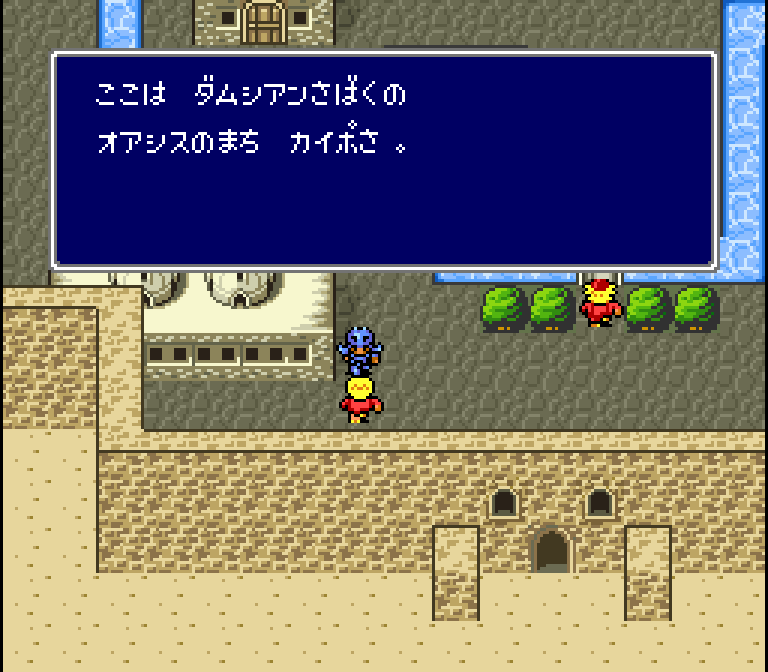 | 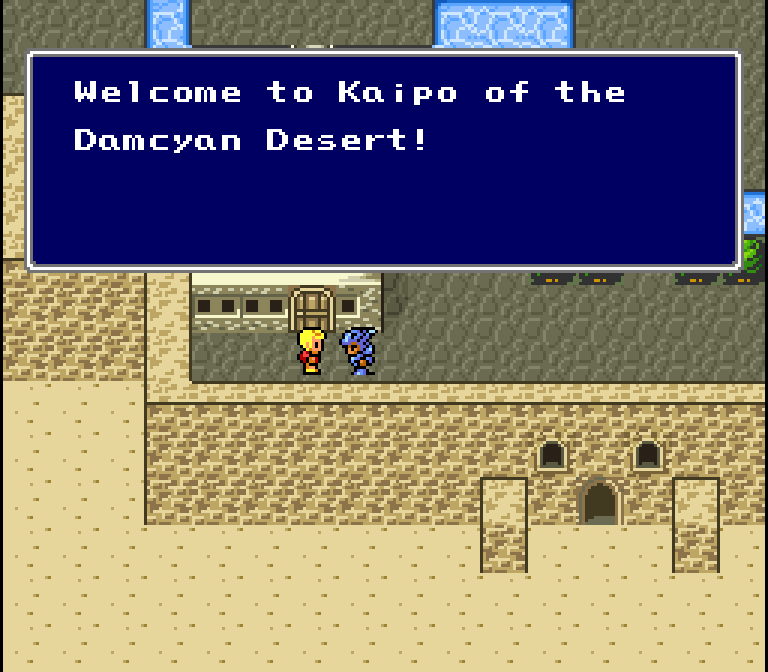 |
| Final Fantasy IV (Super Famicom) | Final Fantasy II (Super NES) |
In English, this greeter says, “Welcome to Kaipo of the Damcyan Desert!”
In Japanese, he says, “This is Kaipo, the oasis town of the Damcyan Desert.”
So again we see that a mention of Kaipo being an oasis was left out.
Note how he doesn’t greet you or welcome you in Japanese. He just gives you the facts.
Snake Boy
A little boy tells you about the underground water vein you have to visit next. Here’s what he says in Japanese and in English:
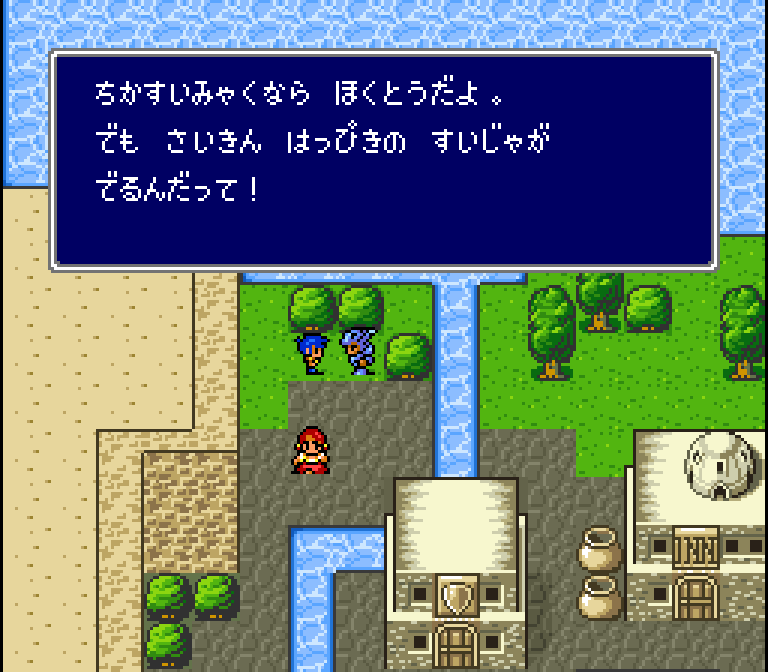 | 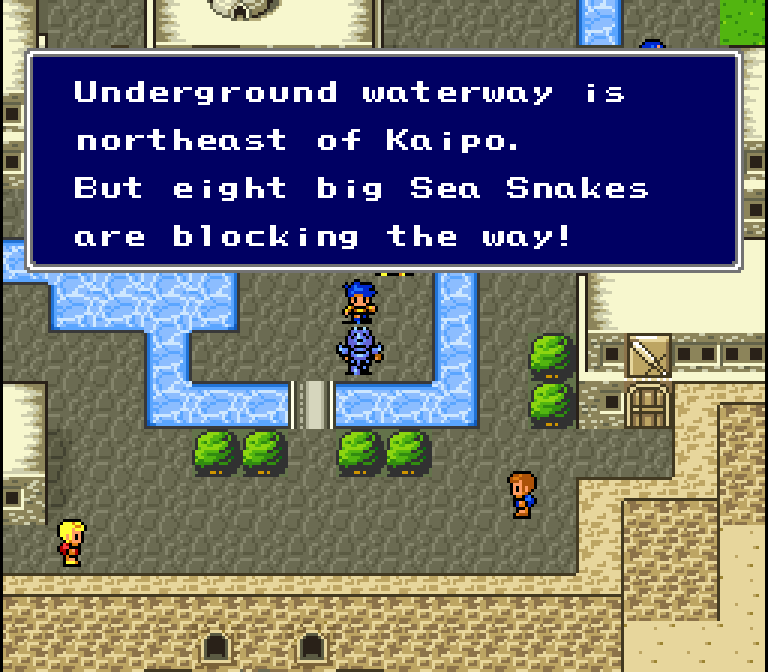 |
| Final Fantasy IV (Super Famicom) | Final Fantasy II (Super NES) |
| Japanese Version (basic translation) | English Translation |
| If you’re looking for the underground water vein, it’s to the northeast. | Underground waterway is northeast of Kaipo. |
| But lately they say there are eight sea serpents that appear there! | But eight big Sea Snakes are blocking the way! |
So here’s what’s noteworthy:
- We saw that the “underground water vein” was translated differently and given its own name earlier: “Watery Pass”. But here it’s now translated as “underground waterway”. It’s not a huge deal, but it was translated inconsistently for some reason.
- The lack of a “the” or an “an” at the beginning lends the English translation that non-native writing feel that was so common in old games.
- The kid says that the eight snakes are a recent thing in Japanese. This fits in with what we learn at the start of the game – that violent monsters have suddenly been increasing. This explains some of the other upcoming bosses too.
- The English version says that the sea snakes are big.
- The English version gives it as a straight fact while the Japanese version makes it clear it isn’t first-hand information.
- The English version also says they’re blocking the way while the Japanese version says they just show up there. This is understandable, since the use of “deru” in this sort of context is always a bit tough to translate well.
Woman-Like Prince
This other guy walking around Kaipo talks about the prince of Damcyan:
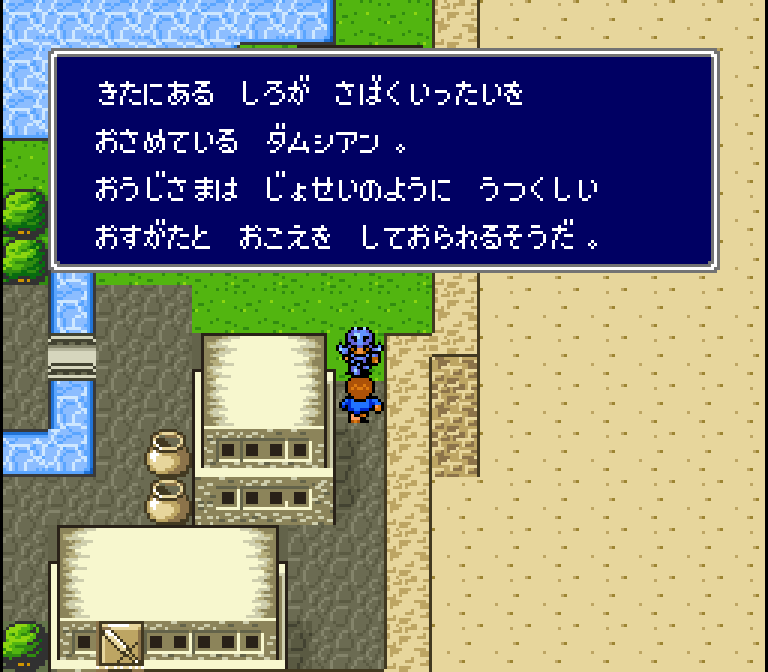 | 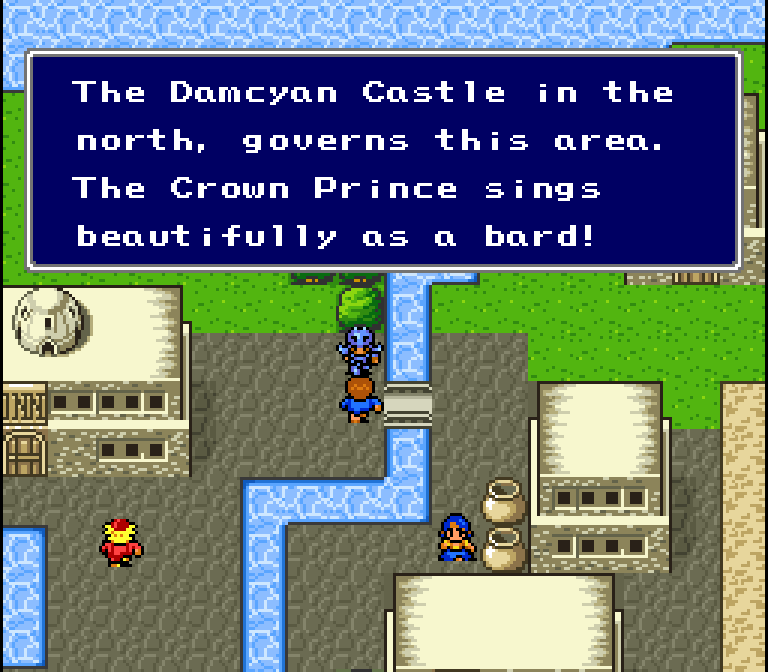 |
| Final Fantasy IV (Super Famicom) | Final Fantasy II (Super NES) |
| Japanese Version (basic translation) | English Translation |
| The castle to the north is Damcyan. It governs the entire desert. | The Damcyan Castle in the north, governs this area. |
| I hear the prince is as beautiful and lovely-sounding as a woman. | The Crown Prince sings beautifully as a bard! |
It’s not a big deal, but he actually says that Damcyan rules over the entire desert in Japanese rather than just “this area” in English.
More importantly, though, is the fact that the English localization makes no mention of the fact that the prince has the beautiful looks of a woman to go along with his beautiful womanly voice.
The English version adds in the part about the prince being a bard, too.
Actually, after checking out the FFII manual, it looks like there’s a beta screenshot of this line, and it’s ever-so-slightly different from the final version:
 | 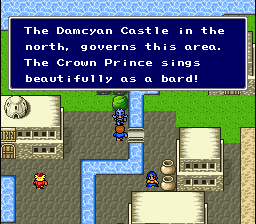 |
| Pre-release version | Final release |
Battle Formation Woman
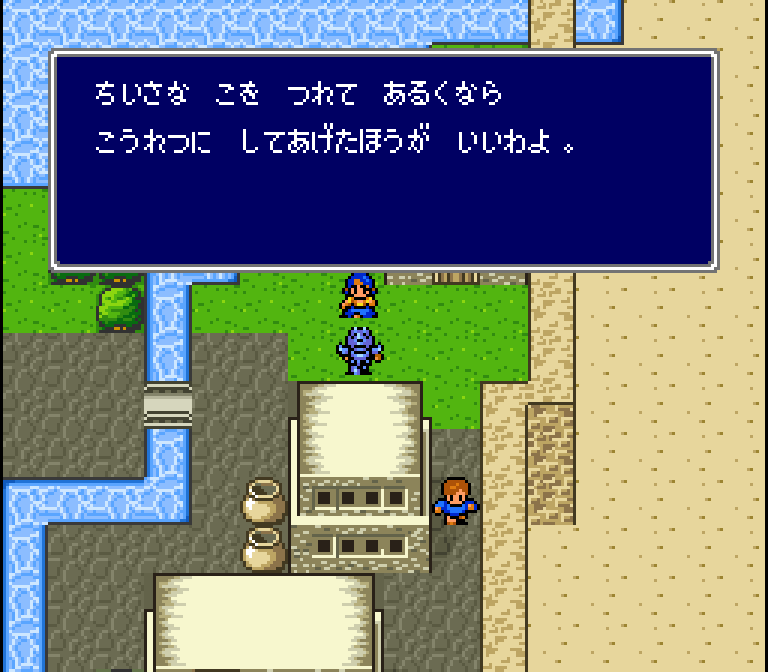 | 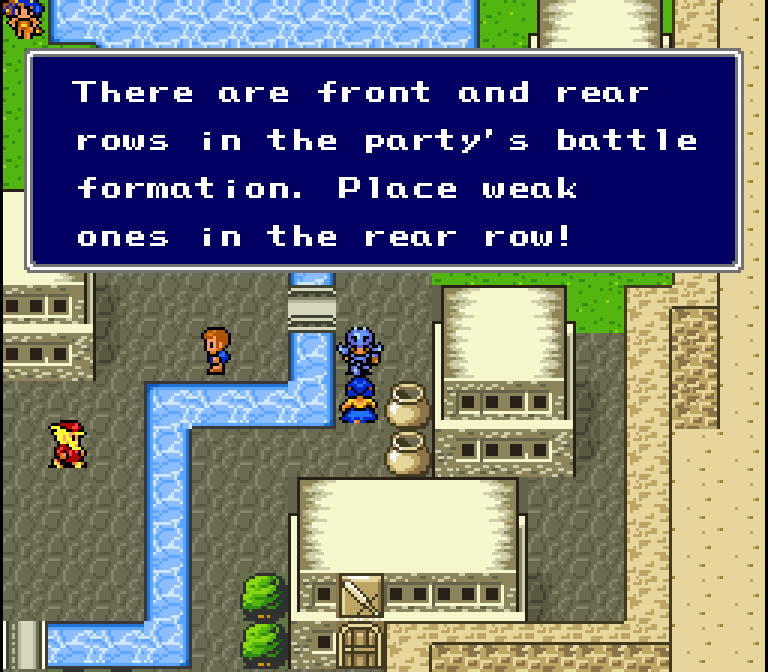 |
| Final Fantasy IV (Super Famicom) | Final Fantasy II (Super NES) |
This lady in Kaipo gives you some helpful advice. In both Japanese versions she says, “If you’re going to walk around with that little girl then you should probably put her in the back row.”
In English, this became, “There are front and rear rows in the party’s battle formation. Place weak ones in the rear row!”
The Japanese hint seems much more specific and helpful in my opinion. The English hint does help, but it was already covered in the training rooms.
Caring Old Woman
This old lady in the northeast house talks about the girl who was found in the desert:
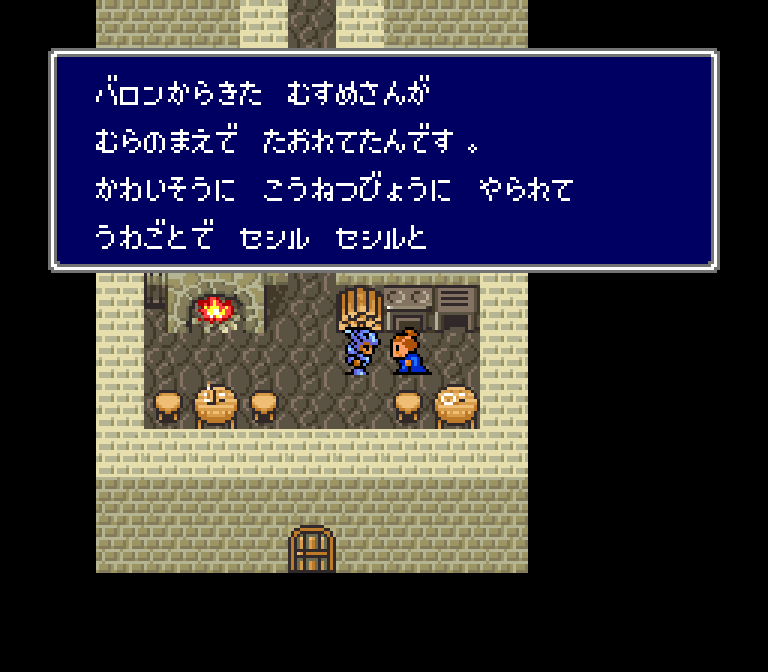 | 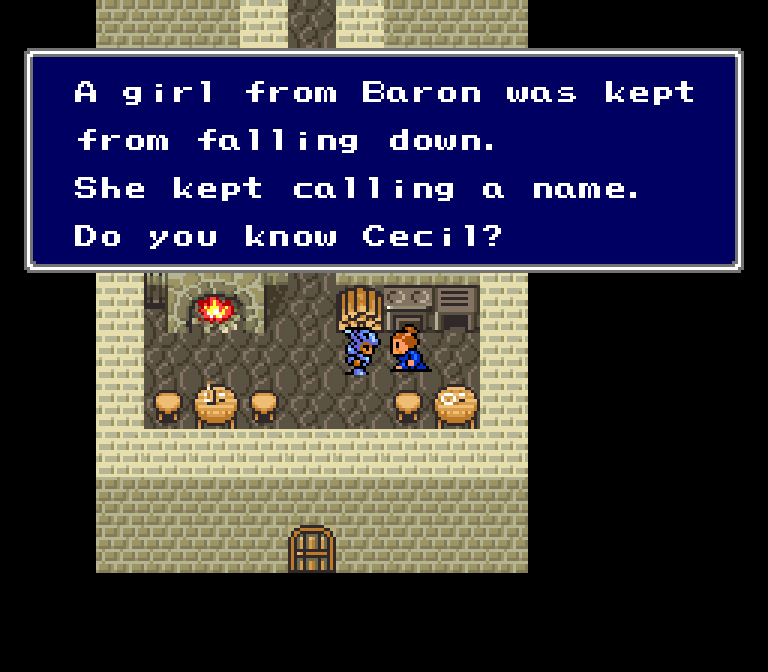 |
| Final Fantasy IV (Super Famicom) | Final Fantasy II (Super NES) |
| Japanese Version (basic translation) | English Translation |
| A girl from Baron fainted in front of the village. | A girl from Baron was kept from falling down. |
| The poor thing has a high fever and just keeps moaning, “Cecil… Cecil…” | She kept calling a name. Do you know Cecil? |
Again, the “falling down” problem strikes again. We can skip that though, since we already looked at it.
More interestingly is that the old lady sounds a lot more sympathetic in the Japanese version.
The English text also sort of changed/added the, “Do you know Cecil?” part.
Rosa’s Fever
Rosa is in bed with a high fever. If you talk to her, she’ll mumble some stuff:
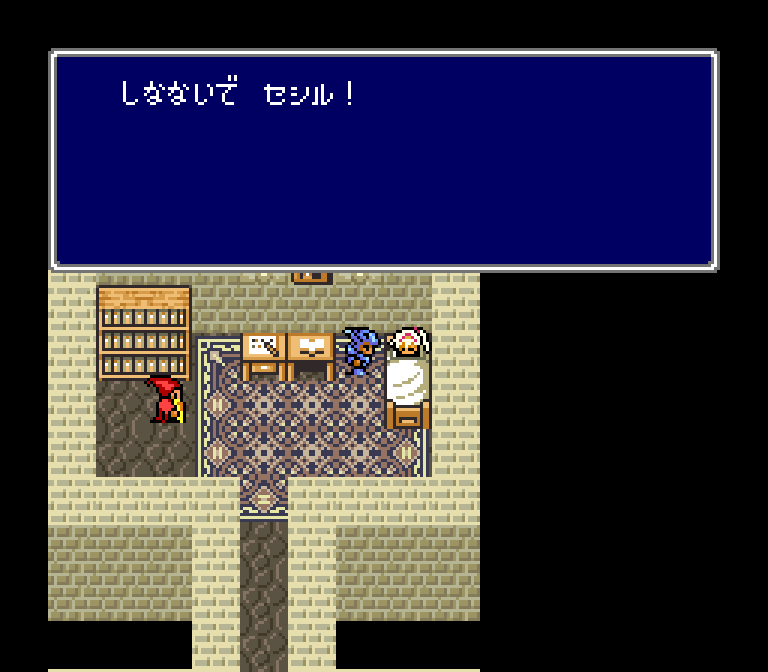 |  |
| Final Fantasy IV (Super Famicom) | Final Fantasy II (Super NES) |
| Japanese Version (basic translation) | English Translation |
| …. | … |
| Nnng…. | …Mmm |
| Cecil…. | …Cecil |
| Don’t die, Cecil! | Don’t leave me, Cecil! |
The big thing that stands out is that “Don’t die!” became “Don’t leave me!”
But more than that, I feel like the English translation is unintentionally awkward and/or suggestive.
If you look at the Japanese text just by itself, you can kind of get the idea that the speaker is in pain or messed up somehow but is worried about some guy named Cecil.
But if you do that with the English text, it almost sounds like something out of a trashy romance novel.
In my own experience I’ve found that it’s very easy to accidentally add unintended interpretations to a translated line. For example, I once almost made a character who just lost his eyes say, “I see!” in response to someone.
Sand Ruby / Light of the Desert
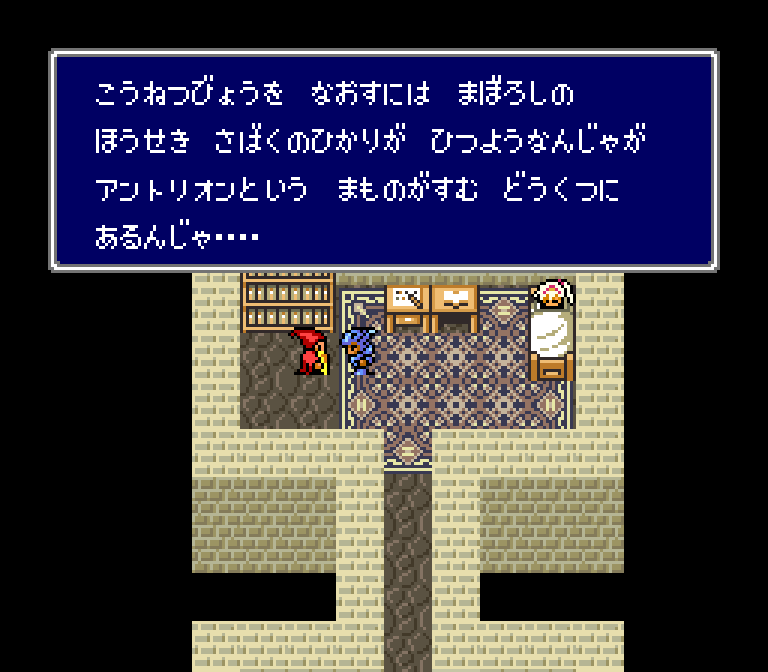 |  |
| Final Fantasy IV (Super Famicom) | Final Fantasy II (Super NES) |
This old wise man tells you how to help Rosa:
| Japanese Version (basic translation) | English Translation |
| To cure her high fever we need the mystical gem, the Light of the Desert. | We need SandRuby to cure the fever. |
| But it’s in a cave where a monster known as the Antlion dwells… | But it is in the lair of the monster called Antlion. |
The major points of interest here are:
- “Light of the Desert” or “Desert Light” became “SandRuby”. At least it’s still a gem. Personally, I like “Sand Ruby” more. I assume the name was changed because “Light of the Desert” was way too long.
- The guy calls this particular gem “mystical” or “legendary” or something along those lines that means it’s extremely rare. Makes me hope this sort of fever isn’t a common thing in Kaipo…
The bookcase behind the old man also changed “Light of the Desert” to “SandRuby”:
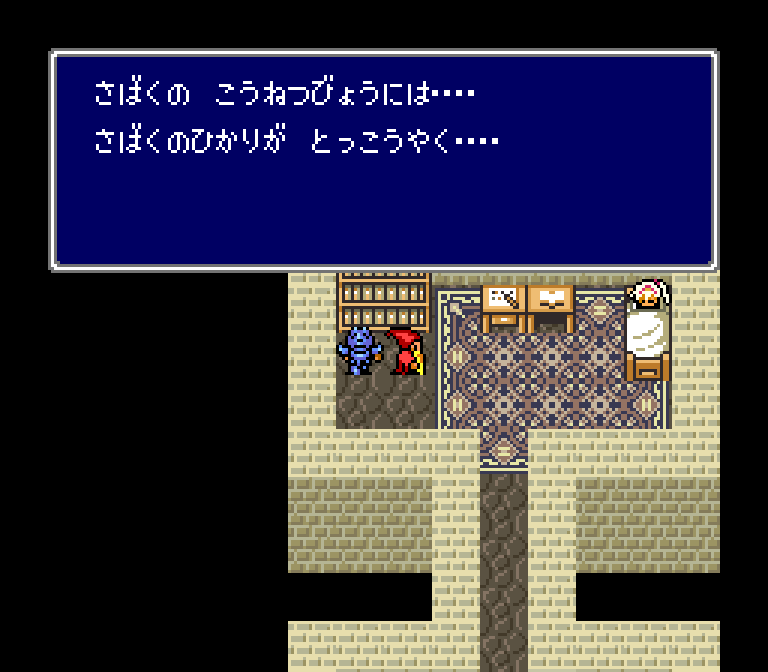 | 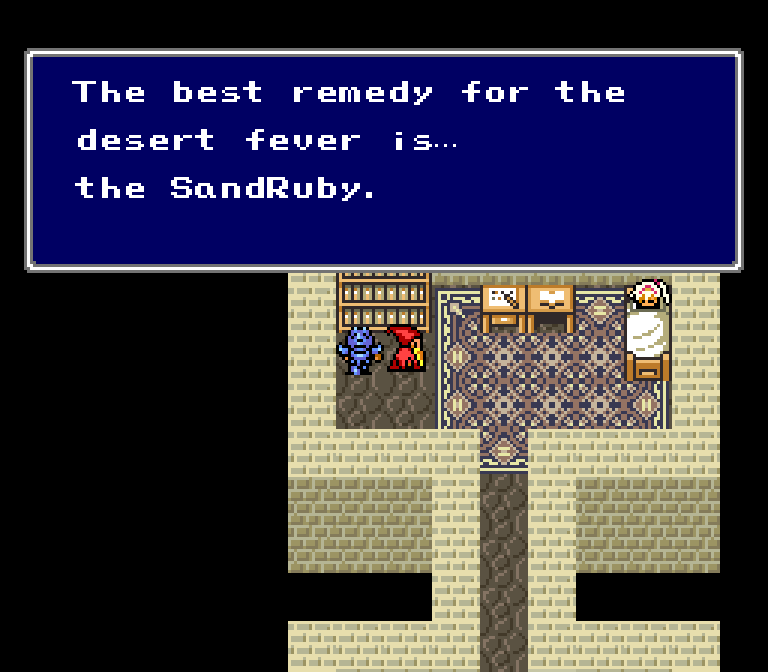 |
| Final Fantasy IV (Super Famicom) | Final Fantasy II (Super NES) |


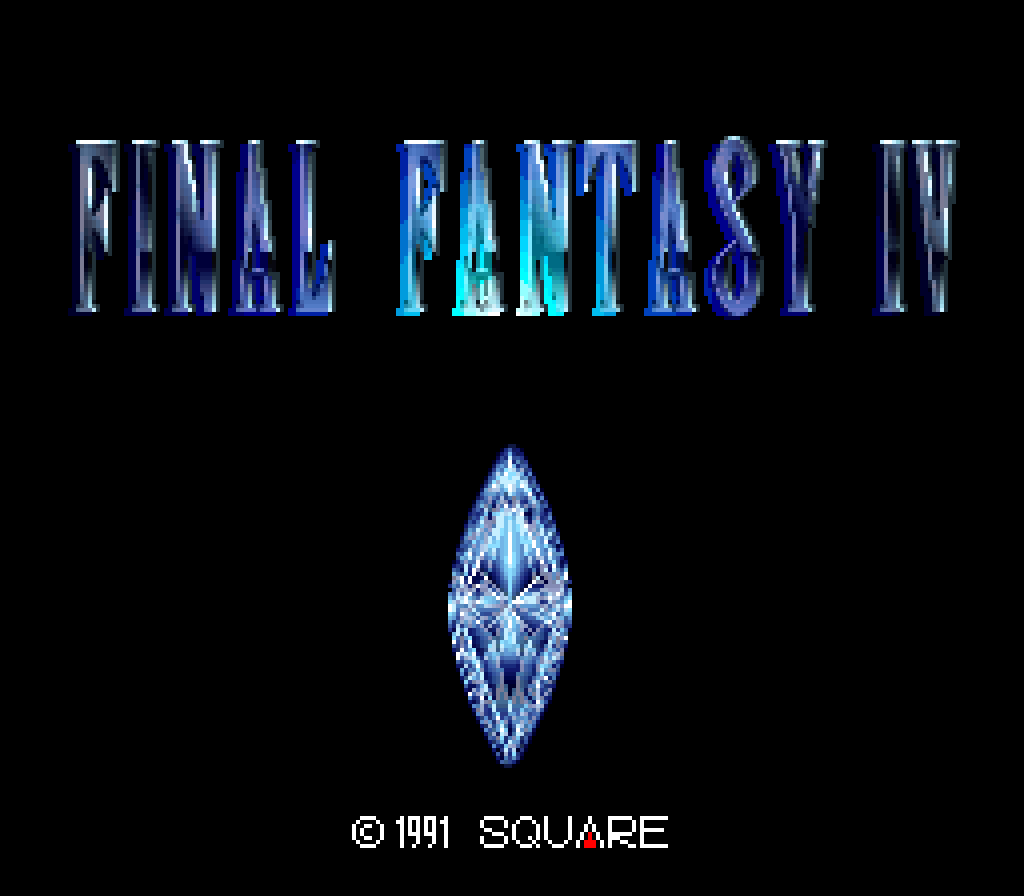
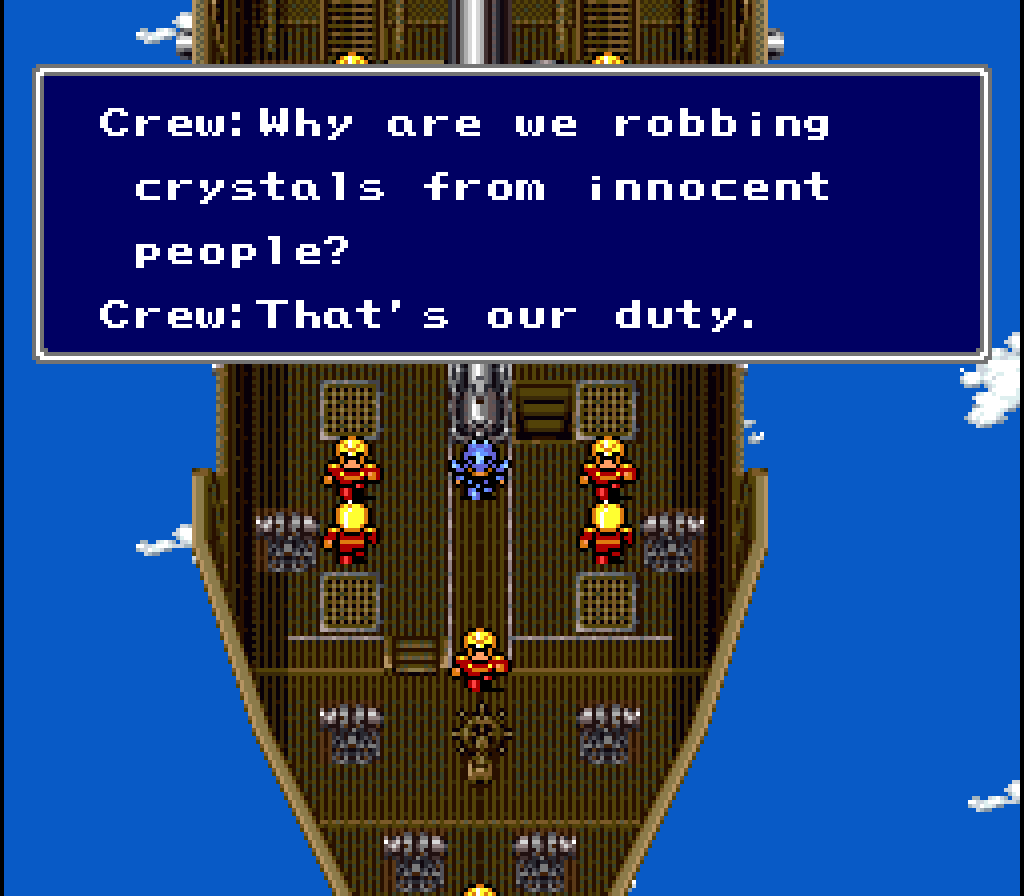
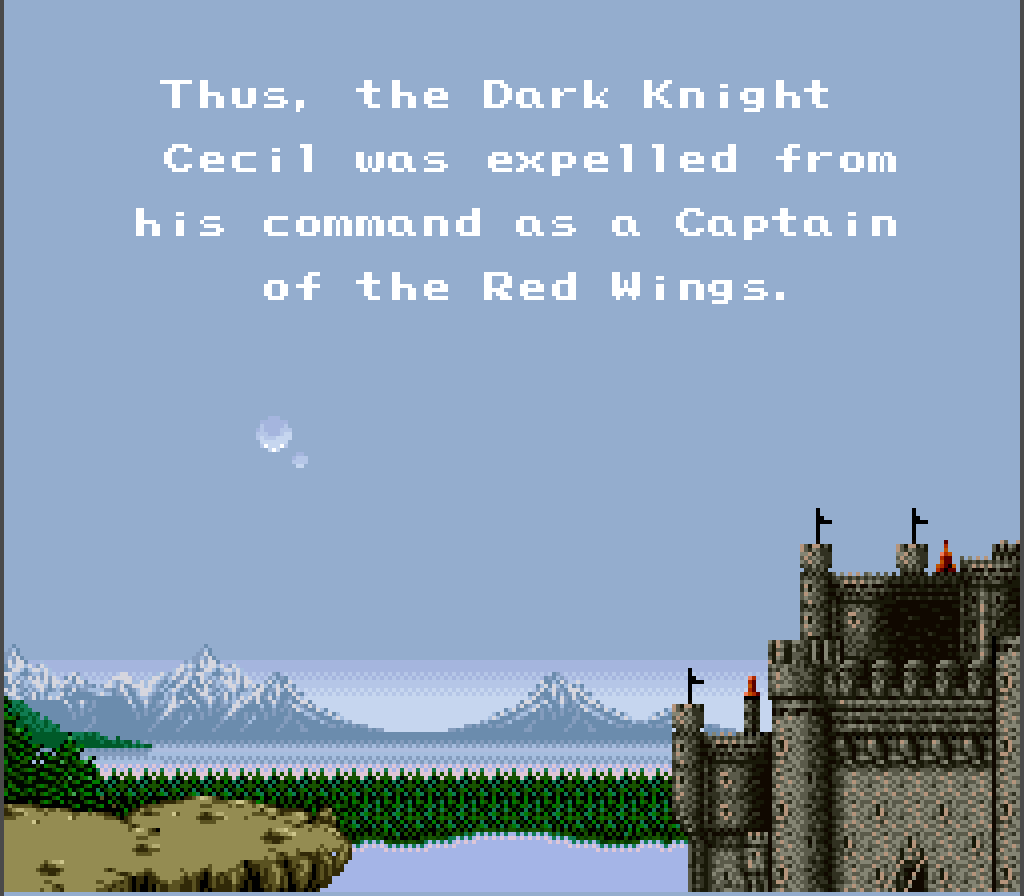
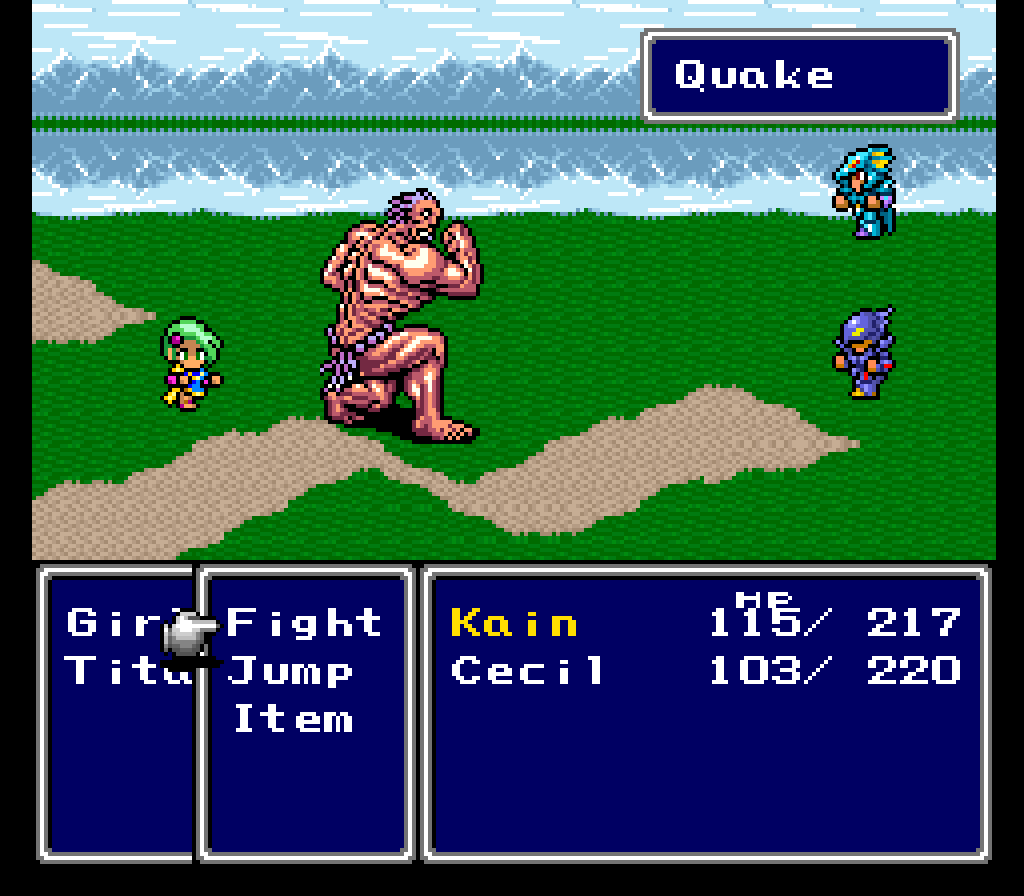
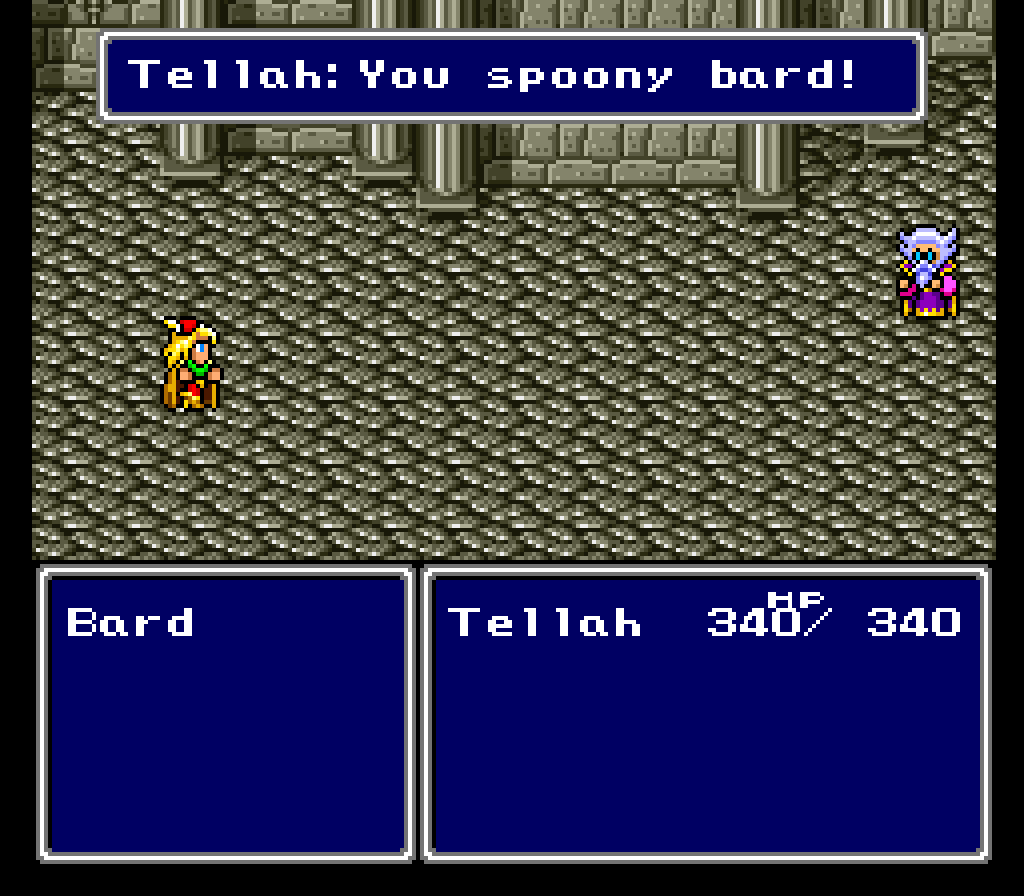
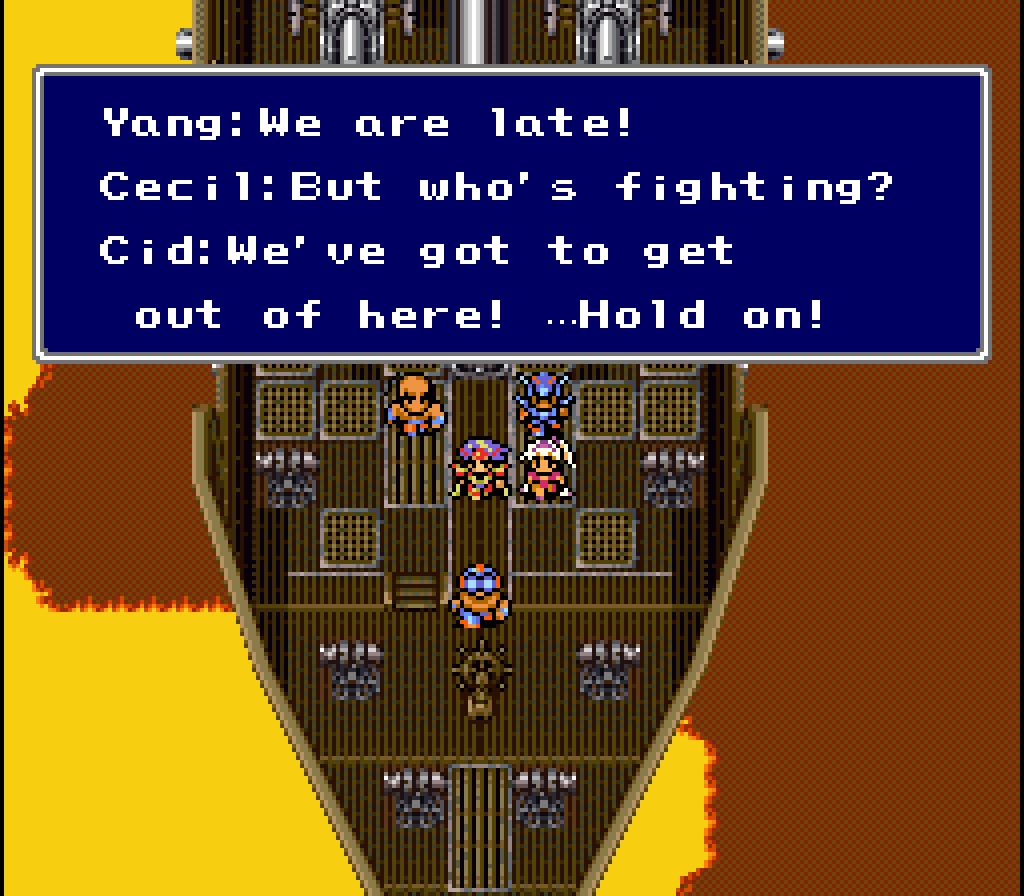
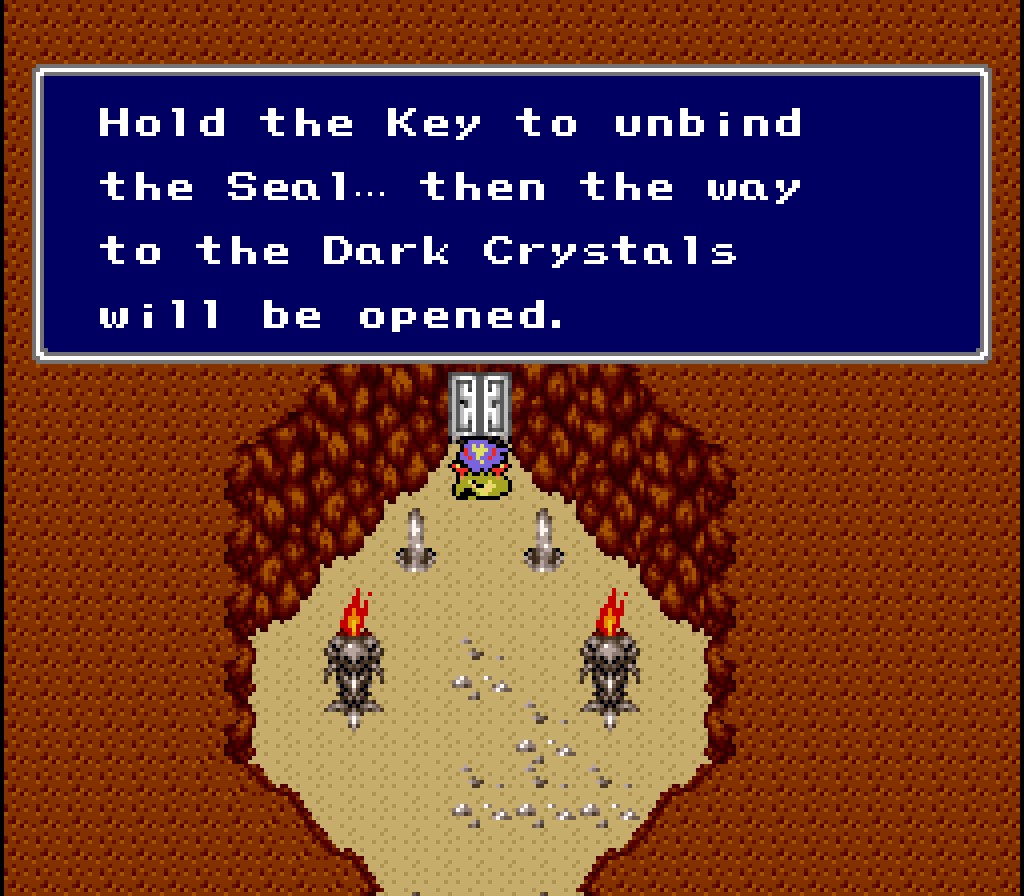
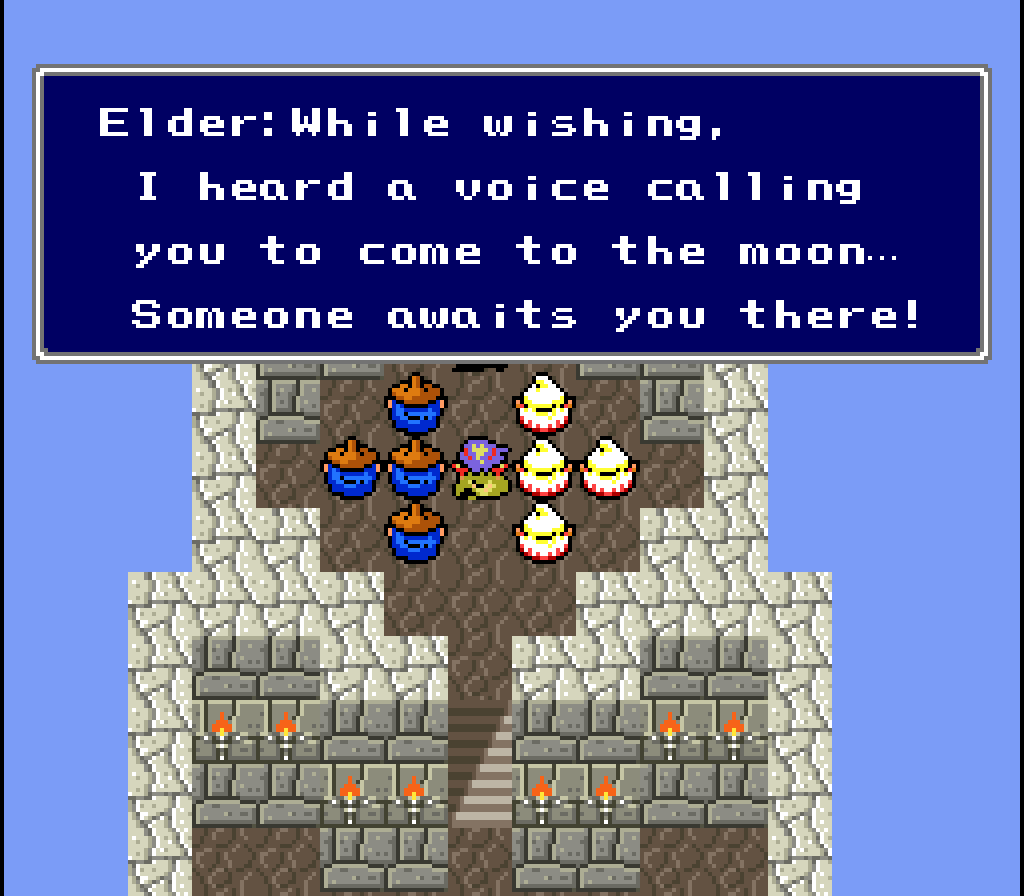
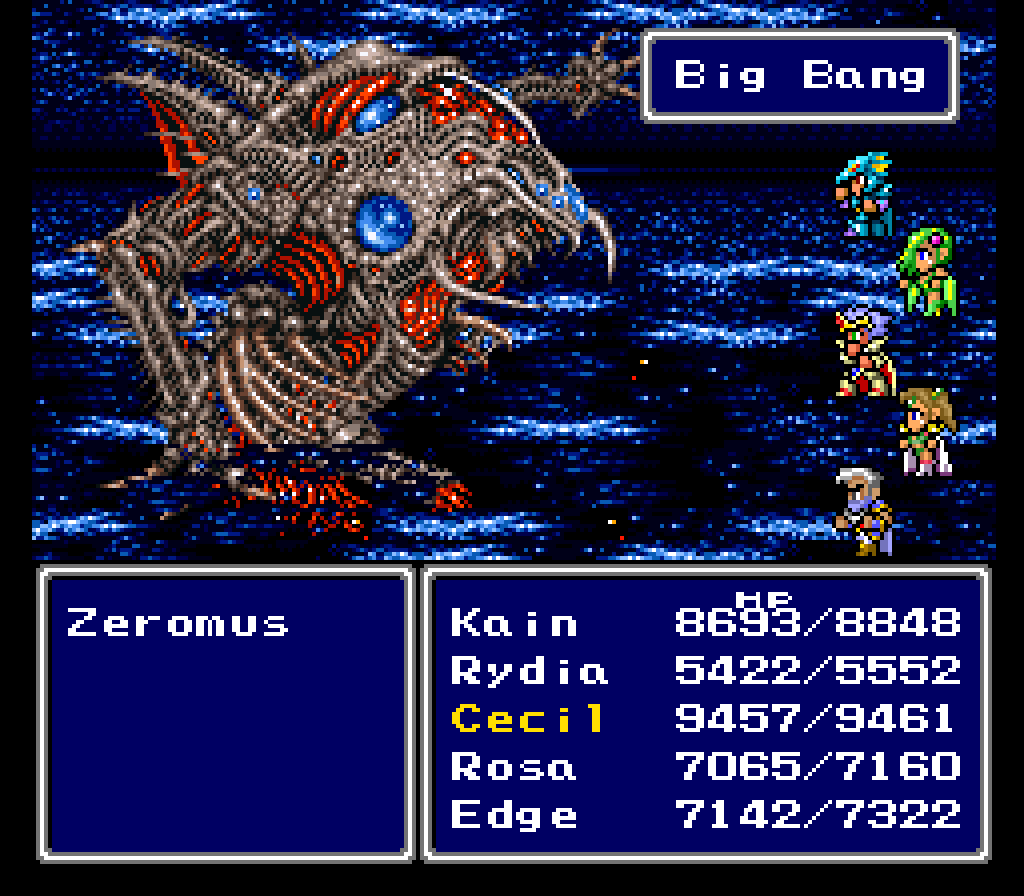
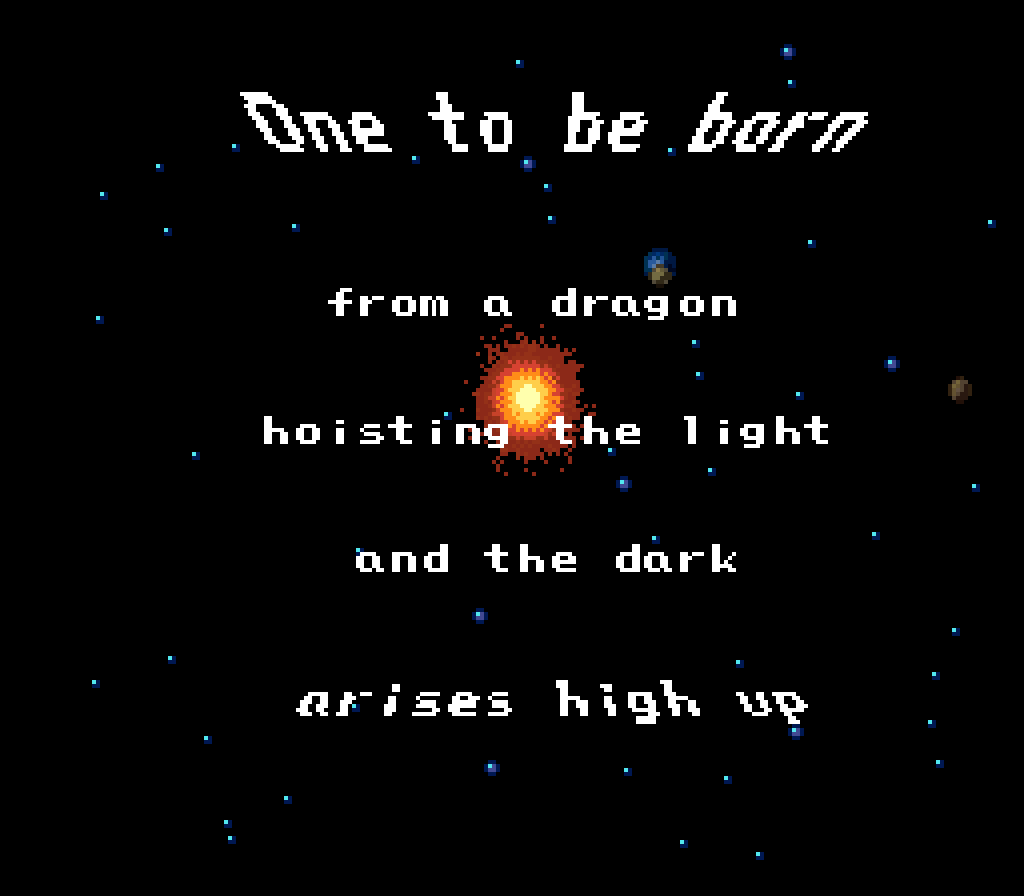
![press start to translate [Final Fantasy IV] press start to translate [Final Fantasy IV]](https://legendsoflocalization.com/wp-content/uploads/2019/08/bbenma.png)
I suspect the reason why they doubled up on the Damcyan references in that one line is because the player just came from Baron, another kingdom. Perhaps the translators were concerned that players might get stuck trying to find a way back to Baron to get permission to enter Antlion Cave?
I like seeing your thoughts on the whole !?/?! thing haha. It’s something I ALWAYS stop to think about any time it comes up in something I’m working on, both in game dev and regular writing. I personally agree with you— “?!” makes most sense grammatically, the sentence being a question is *usually* more important than it being yelled. “!?” perhaps emphasizes the ‘yell’ part, so maybe it would be good to use for someone especially in distress? I’ve wondered before if maybe switching it up depending on context, depending on which is more important to the sentence, would be appropriate, but that’s such subtle nuance I don’t think it would be noticed by most players/readers…and I also sort of prefer the consistency of doing it the same order every time. But the thought has crossed my mind before.
At the same time, though, I really like how “!?” looks, with the curve/hump of the ? kind of going along the !, rather than pointing into it. Looks nice. But then, I’ve had to work with some fonts where the “!” goes really diagonal or off to the side, instead of straight up, where it looks REALLY bad if put like “!?”. In cases of fonts like that, it’s pretty clearly better looking as “?!”. Part of me also finds “!?” nostalgic since I tend to associate it with old pixel art RPGs, probably as a result of being left from Japanese-to-English translations. I usually only ever see “?!” in modern games, never “!?” (granted I’m not the biggest gamer these days).
“!?!” also looks really nice imo for really emphasising distress in dialogue, the two !s framing the single ? nicely. But would want to use that sparingly I think or it would feel silly. I think just the one extra ! is good for like, extra emphasis without seeming too silly, since ellipsis also use three periods. “!?!” feels like a good emotional equivalent to “…”, in other words.